The Role of Talent Management Framework and Its Impact on Organizational Success: A Case Study of Nestle
VerifiedAdded on 2023/06/16
|22
|4082
|334
AI Summary
This research paper explores the role of talent management framework in organizational success through a case study of Nestle. It aims to assess the effectiveness of talent management strategies used by Nestle to improve employee skills and achieve competitive success. The research also identifies the challenges faced by Nestle in implementing talent management strategies and the strategies used to mitigate them. The study concludes that talent management plays a significant role in improving employee skills and achieving competitive success.
Contribute Materials
Your contribution can guide someone’s learning journey. Share your
documents today.
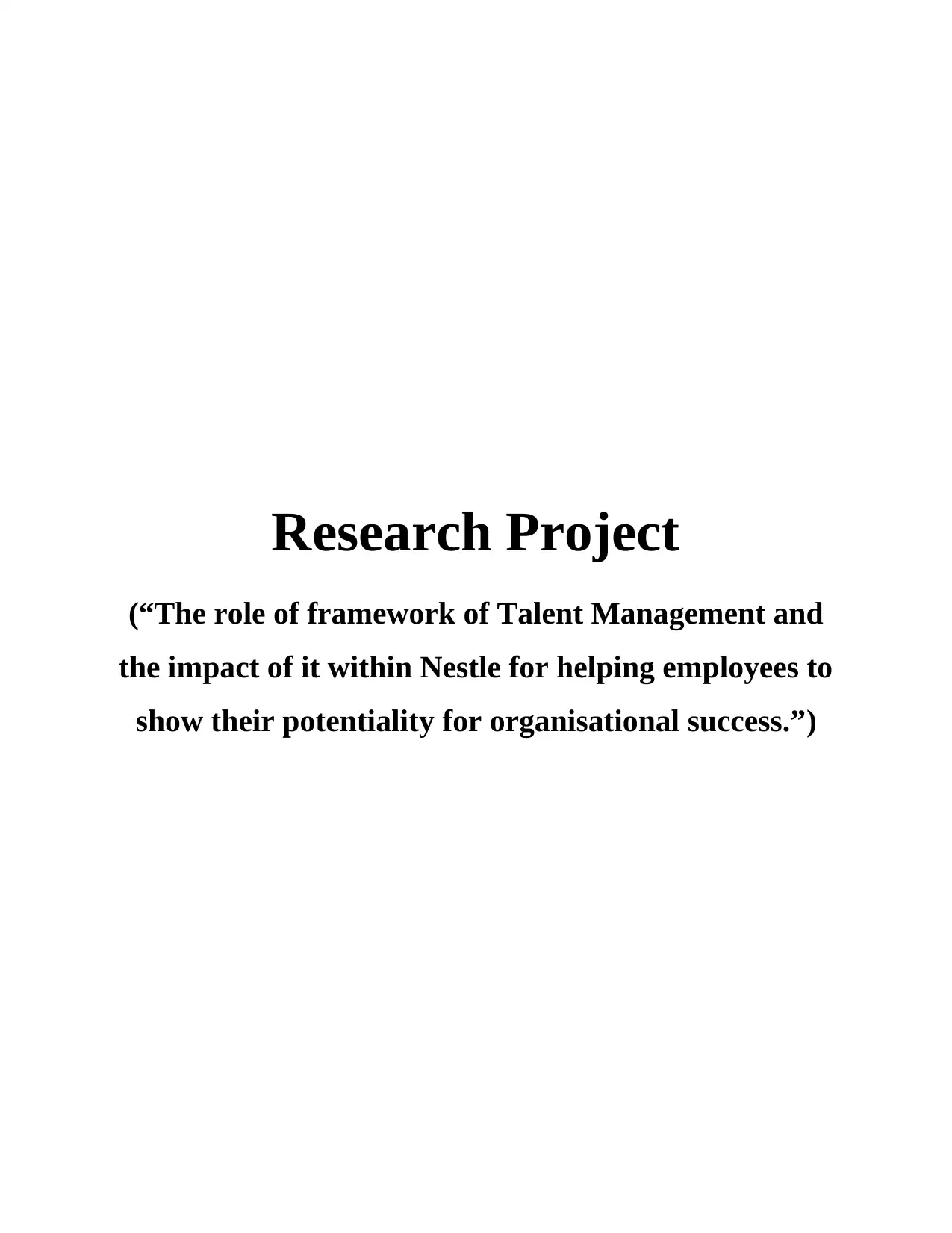
Research Project
(“The role of framework of Talent Management and
the impact of it within Nestle for helping employees to
show their potentiality for organisational success.”)
(“The role of framework of Talent Management and
the impact of it within Nestle for helping employees to
show their potentiality for organisational success.”)
Secure Best Marks with AI Grader
Need help grading? Try our AI Grader for instant feedback on your assignments.
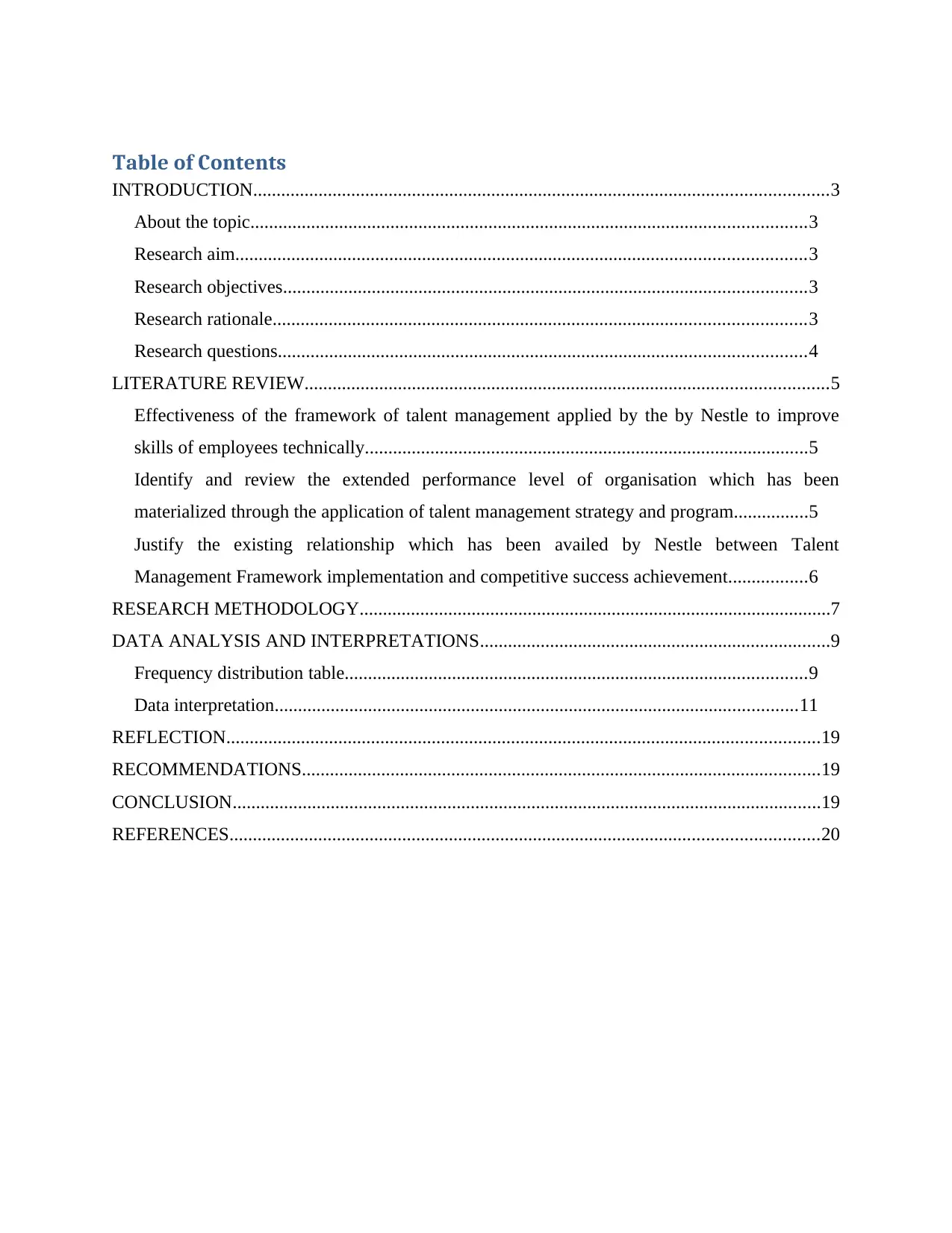
Table of Contents
INTRODUCTION...........................................................................................................................3
About the topic.......................................................................................................................3
Research aim..........................................................................................................................3
Research objectives................................................................................................................3
Research rationale..................................................................................................................3
Research questions.................................................................................................................4
LITERATURE REVIEW................................................................................................................5
Effectiveness of the framework of talent management applied by the by Nestle to improve
skills of employees technically...............................................................................................5
Identify and review the extended performance level of organisation which has been
materialized through the application of talent management strategy and program................5
Justify the existing relationship which has been availed by Nestle between Talent
Management Framework implementation and competitive success achievement.................6
RESEARCH METHODOLOGY.....................................................................................................7
DATA ANALYSIS AND INTERPRETATIONS...........................................................................9
Frequency distribution table...................................................................................................9
Data interpretation................................................................................................................11
REFLECTION...............................................................................................................................19
RECOMMENDATIONS...............................................................................................................19
CONCLUSION..............................................................................................................................19
REFERENCES..............................................................................................................................20
INTRODUCTION...........................................................................................................................3
About the topic.......................................................................................................................3
Research aim..........................................................................................................................3
Research objectives................................................................................................................3
Research rationale..................................................................................................................3
Research questions.................................................................................................................4
LITERATURE REVIEW................................................................................................................5
Effectiveness of the framework of talent management applied by the by Nestle to improve
skills of employees technically...............................................................................................5
Identify and review the extended performance level of organisation which has been
materialized through the application of talent management strategy and program................5
Justify the existing relationship which has been availed by Nestle between Talent
Management Framework implementation and competitive success achievement.................6
RESEARCH METHODOLOGY.....................................................................................................7
DATA ANALYSIS AND INTERPRETATIONS...........................................................................9
Frequency distribution table...................................................................................................9
Data interpretation................................................................................................................11
REFLECTION...............................................................................................................................19
RECOMMENDATIONS...............................................................................................................19
CONCLUSION..............................................................................................................................19
REFERENCES..............................................................................................................................20
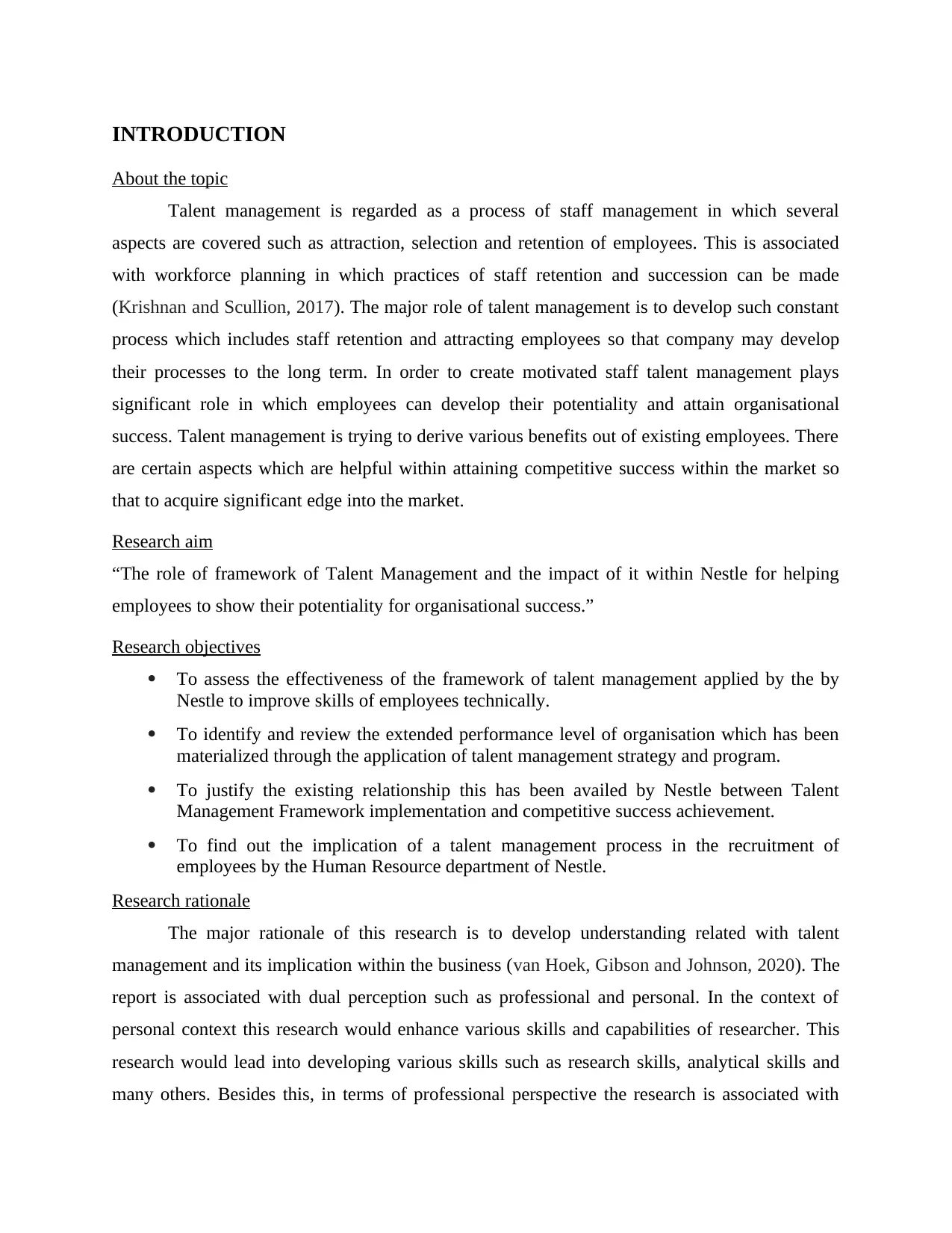
INTRODUCTION
About the topic
Talent management is regarded as a process of staff management in which several
aspects are covered such as attraction, selection and retention of employees. This is associated
with workforce planning in which practices of staff retention and succession can be made
(Krishnan and Scullion, 2017). The major role of talent management is to develop such constant
process which includes staff retention and attracting employees so that company may develop
their processes to the long term. In order to create motivated staff talent management plays
significant role in which employees can develop their potentiality and attain organisational
success. Talent management is trying to derive various benefits out of existing employees. There
are certain aspects which are helpful within attaining competitive success within the market so
that to acquire significant edge into the market.
Research aim
“The role of framework of Talent Management and the impact of it within Nestle for helping
employees to show their potentiality for organisational success.”
Research objectives
To assess the effectiveness of the framework of talent management applied by the by
Nestle to improve skills of employees technically.
To identify and review the extended performance level of organisation which has been
materialized through the application of talent management strategy and program.
To justify the existing relationship this has been availed by Nestle between Talent
Management Framework implementation and competitive success achievement.
To find out the implication of a talent management process in the recruitment of
employees by the Human Resource department of Nestle.
Research rationale
The major rationale of this research is to develop understanding related with talent
management and its implication within the business (van Hoek, Gibson and Johnson, 2020). The
report is associated with dual perception such as professional and personal. In the context of
personal context this research would enhance various skills and capabilities of researcher. This
research would lead into developing various skills such as research skills, analytical skills and
many others. Besides this, in terms of professional perspective the research is associated with
About the topic
Talent management is regarded as a process of staff management in which several
aspects are covered such as attraction, selection and retention of employees. This is associated
with workforce planning in which practices of staff retention and succession can be made
(Krishnan and Scullion, 2017). The major role of talent management is to develop such constant
process which includes staff retention and attracting employees so that company may develop
their processes to the long term. In order to create motivated staff talent management plays
significant role in which employees can develop their potentiality and attain organisational
success. Talent management is trying to derive various benefits out of existing employees. There
are certain aspects which are helpful within attaining competitive success within the market so
that to acquire significant edge into the market.
Research aim
“The role of framework of Talent Management and the impact of it within Nestle for helping
employees to show their potentiality for organisational success.”
Research objectives
To assess the effectiveness of the framework of talent management applied by the by
Nestle to improve skills of employees technically.
To identify and review the extended performance level of organisation which has been
materialized through the application of talent management strategy and program.
To justify the existing relationship this has been availed by Nestle between Talent
Management Framework implementation and competitive success achievement.
To find out the implication of a talent management process in the recruitment of
employees by the Human Resource department of Nestle.
Research rationale
The major rationale of this research is to develop understanding related with talent
management and its implication within the business (van Hoek, Gibson and Johnson, 2020). The
report is associated with dual perception such as professional and personal. In the context of
personal context this research would enhance various skills and capabilities of researcher. This
research would lead into developing various skills such as research skills, analytical skills and
many others. Besides this, in terms of professional perspective the research is associated with
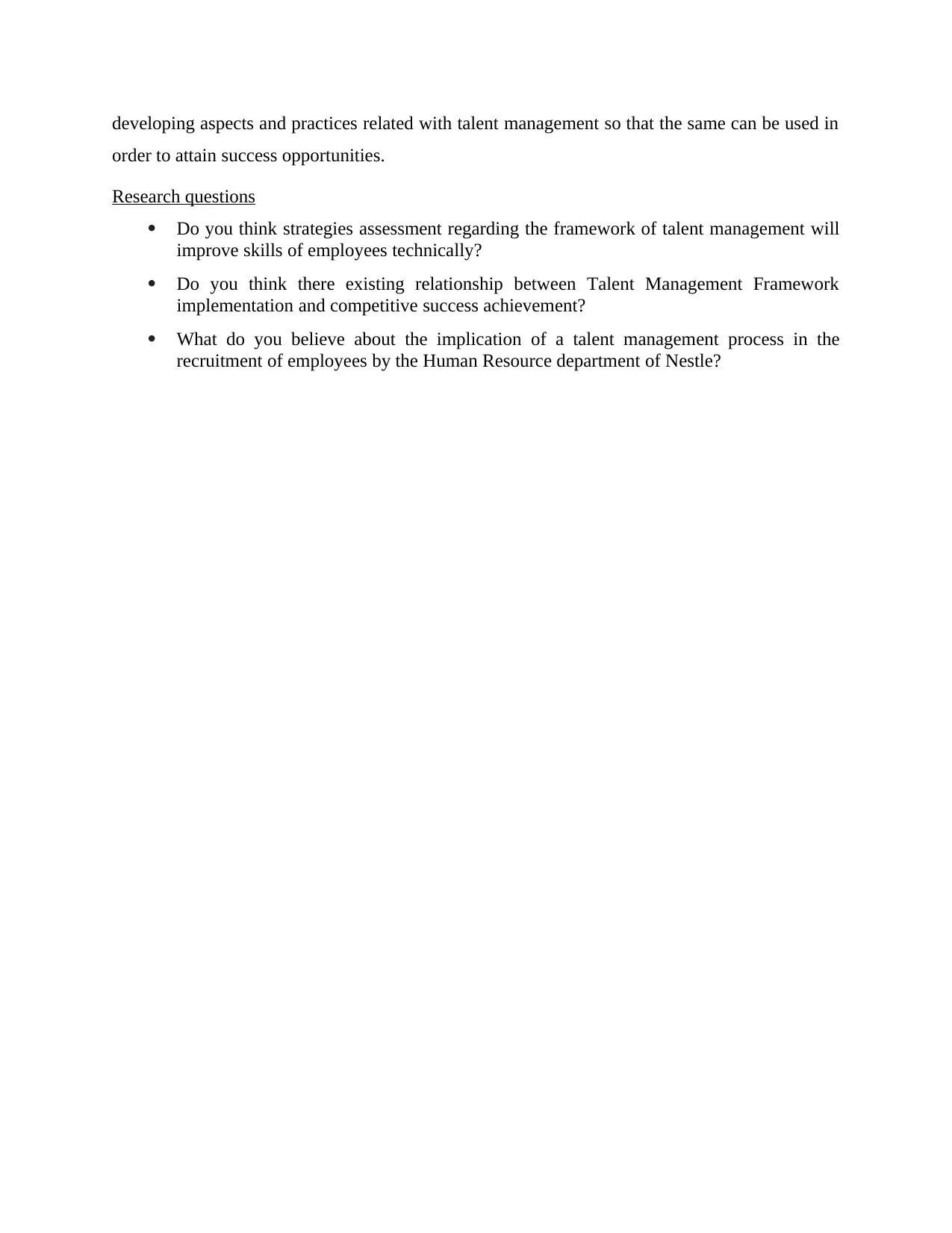
developing aspects and practices related with talent management so that the same can be used in
order to attain success opportunities.
Research questions
Do you think strategies assessment regarding the framework of talent management will
improve skills of employees technically?
Do you think there existing relationship between Talent Management Framework
implementation and competitive success achievement?
What do you believe about the implication of a talent management process in the
recruitment of employees by the Human Resource department of Nestle?
order to attain success opportunities.
Research questions
Do you think strategies assessment regarding the framework of talent management will
improve skills of employees technically?
Do you think there existing relationship between Talent Management Framework
implementation and competitive success achievement?
What do you believe about the implication of a talent management process in the
recruitment of employees by the Human Resource department of Nestle?
Secure Best Marks with AI Grader
Need help grading? Try our AI Grader for instant feedback on your assignments.
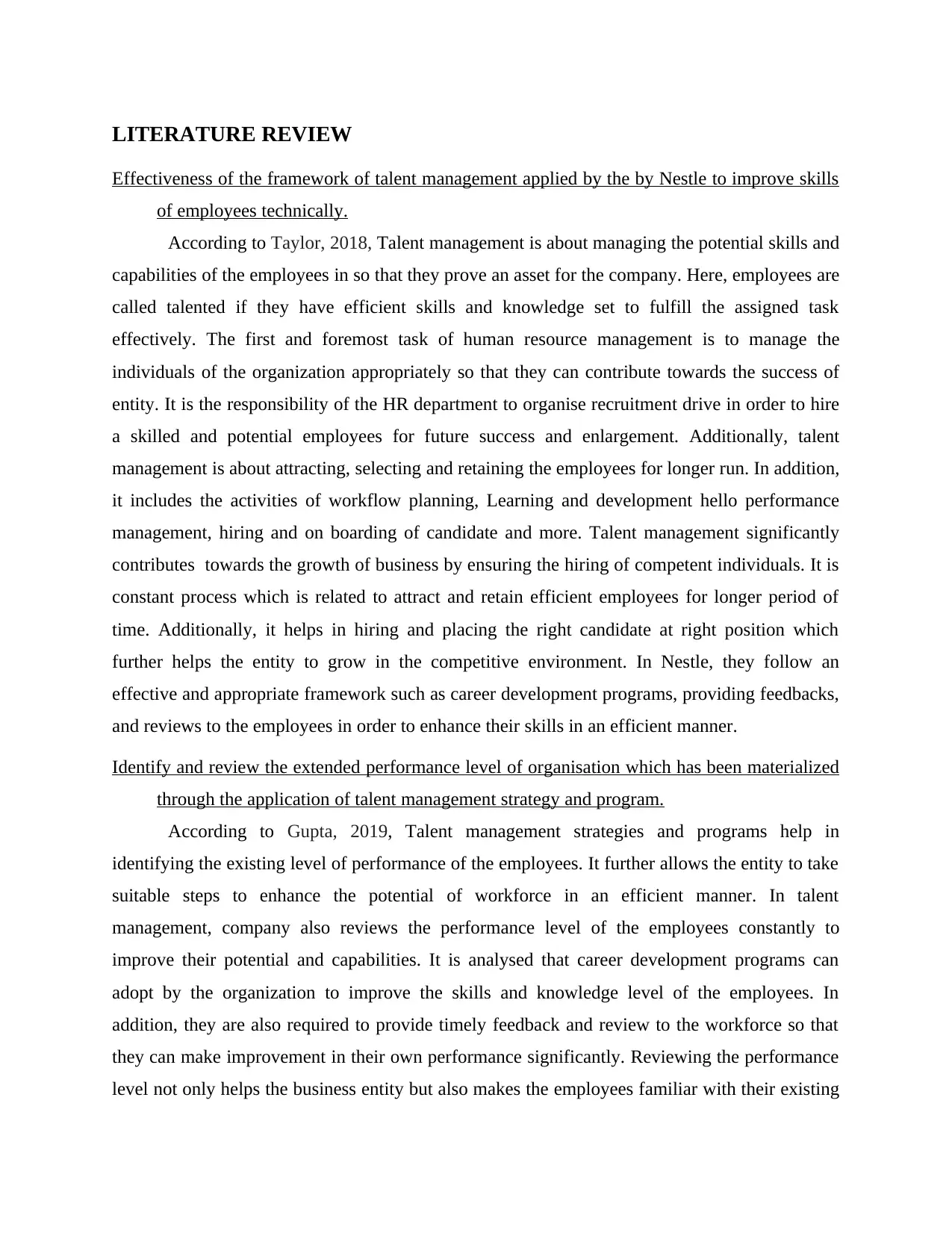
LITERATURE REVIEW
Effectiveness of the framework of talent management applied by the by Nestle to improve skills
of employees technically.
According to Taylor, 2018, Talent management is about managing the potential skills and
capabilities of the employees in so that they prove an asset for the company. Here, employees are
called talented if they have efficient skills and knowledge set to fulfill the assigned task
effectively. The first and foremost task of human resource management is to manage the
individuals of the organization appropriately so that they can contribute towards the success of
entity. It is the responsibility of the HR department to organise recruitment drive in order to hire
a skilled and potential employees for future success and enlargement. Additionally, talent
management is about attracting, selecting and retaining the employees for longer run. In addition,
it includes the activities of workflow planning, Learning and development hello performance
management, hiring and on boarding of candidate and more. Talent management significantly
contributes towards the growth of business by ensuring the hiring of competent individuals. It is
constant process which is related to attract and retain efficient employees for longer period of
time. Additionally, it helps in hiring and placing the right candidate at right position which
further helps the entity to grow in the competitive environment. In Nestle, they follow an
effective and appropriate framework such as career development programs, providing feedbacks,
and reviews to the employees in order to enhance their skills in an efficient manner.
Identify and review the extended performance level of organisation which has been materialized
through the application of talent management strategy and program.
According to Gupta, 2019, Talent management strategies and programs help in
identifying the existing level of performance of the employees. It further allows the entity to take
suitable steps to enhance the potential of workforce in an efficient manner. In talent
management, company also reviews the performance level of the employees constantly to
improve their potential and capabilities. It is analysed that career development programs can
adopt by the organization to improve the skills and knowledge level of the employees. In
addition, they are also required to provide timely feedback and review to the workforce so that
they can make improvement in their own performance significantly. Reviewing the performance
level not only helps the business entity but also makes the employees familiar with their existing
Effectiveness of the framework of talent management applied by the by Nestle to improve skills
of employees technically.
According to Taylor, 2018, Talent management is about managing the potential skills and
capabilities of the employees in so that they prove an asset for the company. Here, employees are
called talented if they have efficient skills and knowledge set to fulfill the assigned task
effectively. The first and foremost task of human resource management is to manage the
individuals of the organization appropriately so that they can contribute towards the success of
entity. It is the responsibility of the HR department to organise recruitment drive in order to hire
a skilled and potential employees for future success and enlargement. Additionally, talent
management is about attracting, selecting and retaining the employees for longer run. In addition,
it includes the activities of workflow planning, Learning and development hello performance
management, hiring and on boarding of candidate and more. Talent management significantly
contributes towards the growth of business by ensuring the hiring of competent individuals. It is
constant process which is related to attract and retain efficient employees for longer period of
time. Additionally, it helps in hiring and placing the right candidate at right position which
further helps the entity to grow in the competitive environment. In Nestle, they follow an
effective and appropriate framework such as career development programs, providing feedbacks,
and reviews to the employees in order to enhance their skills in an efficient manner.
Identify and review the extended performance level of organisation which has been materialized
through the application of talent management strategy and program.
According to Gupta, 2019, Talent management strategies and programs help in
identifying the existing level of performance of the employees. It further allows the entity to take
suitable steps to enhance the potential of workforce in an efficient manner. In talent
management, company also reviews the performance level of the employees constantly to
improve their potential and capabilities. It is analysed that career development programs can
adopt by the organization to improve the skills and knowledge level of the employees. In
addition, they are also required to provide timely feedback and review to the workforce so that
they can make improvement in their own performance significantly. Reviewing the performance
level not only helps the business entity but also makes the employees familiar with their existing
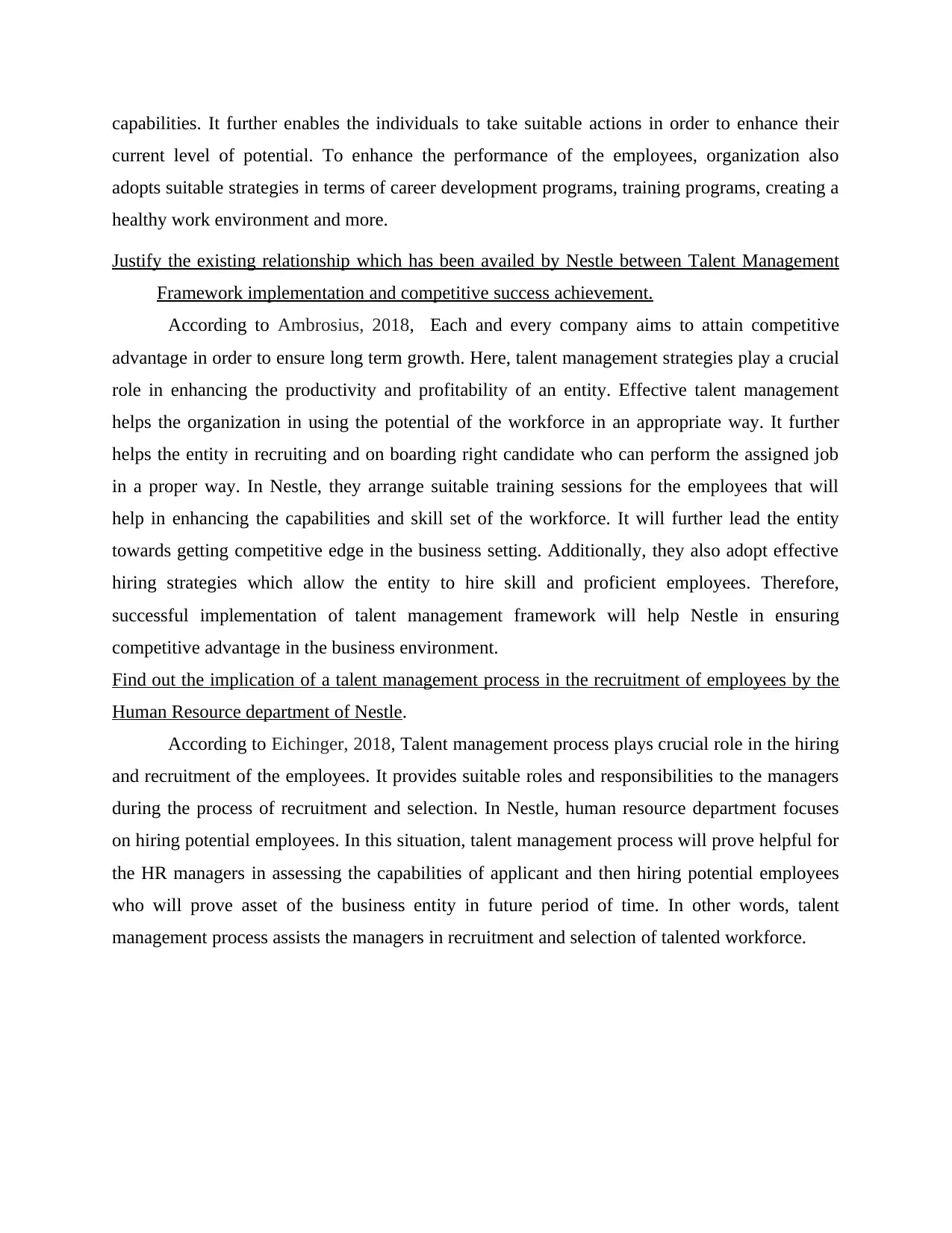
capabilities. It further enables the individuals to take suitable actions in order to enhance their
current level of potential. To enhance the performance of the employees, organization also
adopts suitable strategies in terms of career development programs, training programs, creating a
healthy work environment and more.
Justify the existing relationship which has been availed by Nestle between Talent Management
Framework implementation and competitive success achievement.
According to Ambrosius, 2018, Each and every company aims to attain competitive
advantage in order to ensure long term growth. Here, talent management strategies play a crucial
role in enhancing the productivity and profitability of an entity. Effective talent management
helps the organization in using the potential of the workforce in an appropriate way. It further
helps the entity in recruiting and on boarding right candidate who can perform the assigned job
in a proper way. In Nestle, they arrange suitable training sessions for the employees that will
help in enhancing the capabilities and skill set of the workforce. It will further lead the entity
towards getting competitive edge in the business setting. Additionally, they also adopt effective
hiring strategies which allow the entity to hire skill and proficient employees. Therefore,
successful implementation of talent management framework will help Nestle in ensuring
competitive advantage in the business environment.
Find out the implication of a talent management process in the recruitment of employees by the
Human Resource department of Nestle.
According to Eichinger, 2018, Talent management process plays crucial role in the hiring
and recruitment of the employees. It provides suitable roles and responsibilities to the managers
during the process of recruitment and selection. In Nestle, human resource department focuses
on hiring potential employees. In this situation, talent management process will prove helpful for
the HR managers in assessing the capabilities of applicant and then hiring potential employees
who will prove asset of the business entity in future period of time. In other words, talent
management process assists the managers in recruitment and selection of talented workforce.
current level of potential. To enhance the performance of the employees, organization also
adopts suitable strategies in terms of career development programs, training programs, creating a
healthy work environment and more.
Justify the existing relationship which has been availed by Nestle between Talent Management
Framework implementation and competitive success achievement.
According to Ambrosius, 2018, Each and every company aims to attain competitive
advantage in order to ensure long term growth. Here, talent management strategies play a crucial
role in enhancing the productivity and profitability of an entity. Effective talent management
helps the organization in using the potential of the workforce in an appropriate way. It further
helps the entity in recruiting and on boarding right candidate who can perform the assigned job
in a proper way. In Nestle, they arrange suitable training sessions for the employees that will
help in enhancing the capabilities and skill set of the workforce. It will further lead the entity
towards getting competitive edge in the business setting. Additionally, they also adopt effective
hiring strategies which allow the entity to hire skill and proficient employees. Therefore,
successful implementation of talent management framework will help Nestle in ensuring
competitive advantage in the business environment.
Find out the implication of a talent management process in the recruitment of employees by the
Human Resource department of Nestle.
According to Eichinger, 2018, Talent management process plays crucial role in the hiring
and recruitment of the employees. It provides suitable roles and responsibilities to the managers
during the process of recruitment and selection. In Nestle, human resource department focuses
on hiring potential employees. In this situation, talent management process will prove helpful for
the HR managers in assessing the capabilities of applicant and then hiring potential employees
who will prove asset of the business entity in future period of time. In other words, talent
management process assists the managers in recruitment and selection of talented workforce.
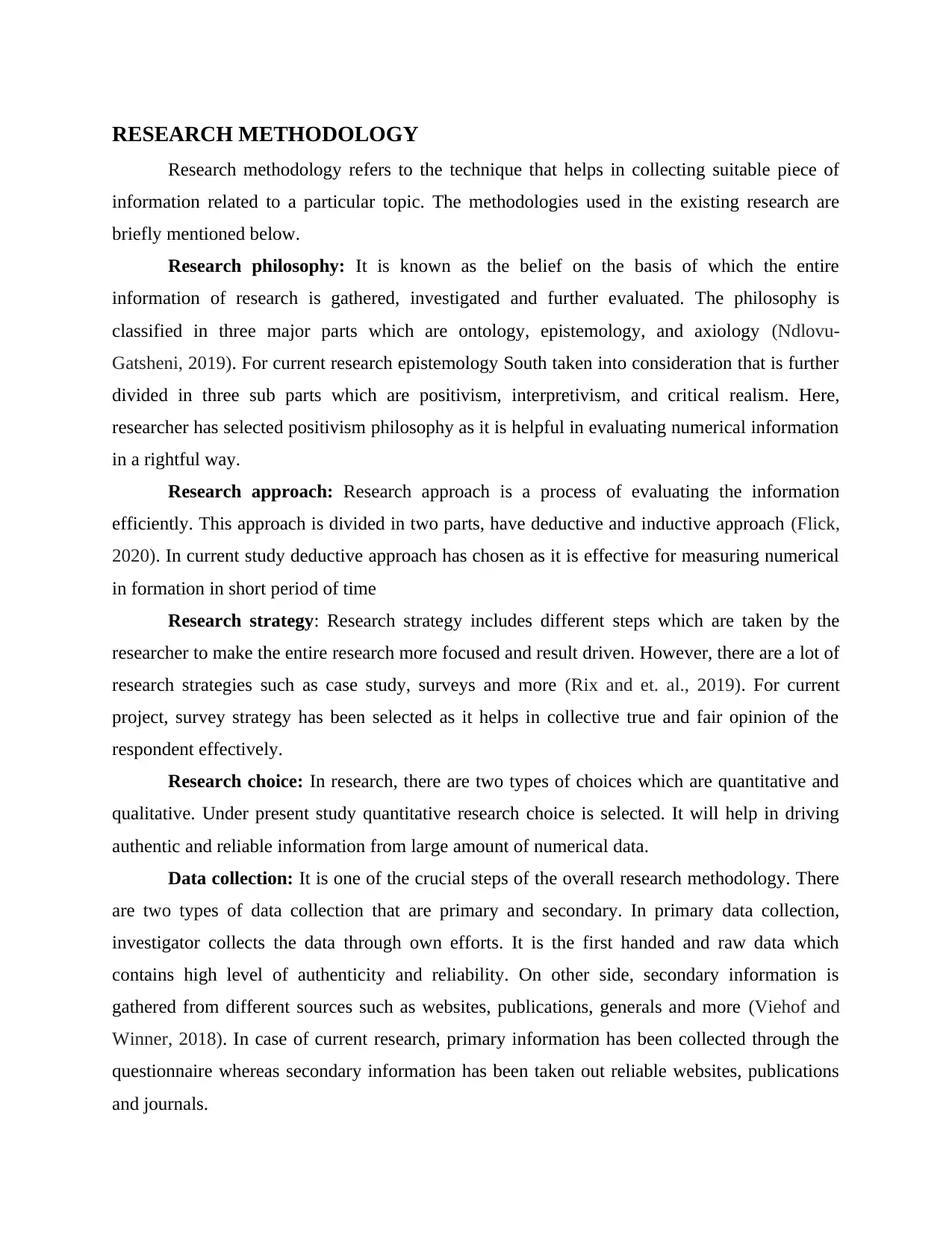
RESEARCH METHODOLOGY
Research methodology refers to the technique that helps in collecting suitable piece of
information related to a particular topic. The methodologies used in the existing research are
briefly mentioned below.
Research philosophy: It is known as the belief on the basis of which the entire
information of research is gathered, investigated and further evaluated. The philosophy is
classified in three major parts which are ontology, epistemology, and axiology (Ndlovu-
Gatsheni, 2019). For current research epistemology South taken into consideration that is further
divided in three sub parts which are positivism, interpretivism, and critical realism. Here,
researcher has selected positivism philosophy as it is helpful in evaluating numerical information
in a rightful way.
Research approach: Research approach is a process of evaluating the information
efficiently. This approach is divided in two parts, have deductive and inductive approach (Flick,
2020). In current study deductive approach has chosen as it is effective for measuring numerical
in formation in short period of time
Research strategy: Research strategy includes different steps which are taken by the
researcher to make the entire research more focused and result driven. However, there are a lot of
research strategies such as case study, surveys and more (Rix and et. al., 2019). For current
project, survey strategy has been selected as it helps in collective true and fair opinion of the
respondent effectively.
Research choice: In research, there are two types of choices which are quantitative and
qualitative. Under present study quantitative research choice is selected. It will help in driving
authentic and reliable information from large amount of numerical data.
Data collection: It is one of the crucial steps of the overall research methodology. There
are two types of data collection that are primary and secondary. In primary data collection,
investigator collects the data through own efforts. It is the first handed and raw data which
contains high level of authenticity and reliability. On other side, secondary information is
gathered from different sources such as websites, publications, generals and more (Viehof and
Winner, 2018). In case of current research, primary information has been collected through the
questionnaire whereas secondary information has been taken out reliable websites, publications
and journals.
Research methodology refers to the technique that helps in collecting suitable piece of
information related to a particular topic. The methodologies used in the existing research are
briefly mentioned below.
Research philosophy: It is known as the belief on the basis of which the entire
information of research is gathered, investigated and further evaluated. The philosophy is
classified in three major parts which are ontology, epistemology, and axiology (Ndlovu-
Gatsheni, 2019). For current research epistemology South taken into consideration that is further
divided in three sub parts which are positivism, interpretivism, and critical realism. Here,
researcher has selected positivism philosophy as it is helpful in evaluating numerical information
in a rightful way.
Research approach: Research approach is a process of evaluating the information
efficiently. This approach is divided in two parts, have deductive and inductive approach (Flick,
2020). In current study deductive approach has chosen as it is effective for measuring numerical
in formation in short period of time
Research strategy: Research strategy includes different steps which are taken by the
researcher to make the entire research more focused and result driven. However, there are a lot of
research strategies such as case study, surveys and more (Rix and et. al., 2019). For current
project, survey strategy has been selected as it helps in collective true and fair opinion of the
respondent effectively.
Research choice: In research, there are two types of choices which are quantitative and
qualitative. Under present study quantitative research choice is selected. It will help in driving
authentic and reliable information from large amount of numerical data.
Data collection: It is one of the crucial steps of the overall research methodology. There
are two types of data collection that are primary and secondary. In primary data collection,
investigator collects the data through own efforts. It is the first handed and raw data which
contains high level of authenticity and reliability. On other side, secondary information is
gathered from different sources such as websites, publications, generals and more (Viehof and
Winner, 2018). In case of current research, primary information has been collected through the
questionnaire whereas secondary information has been taken out reliable websites, publications
and journals.
Paraphrase This Document
Need a fresh take? Get an instant paraphrase of this document with our AI Paraphraser
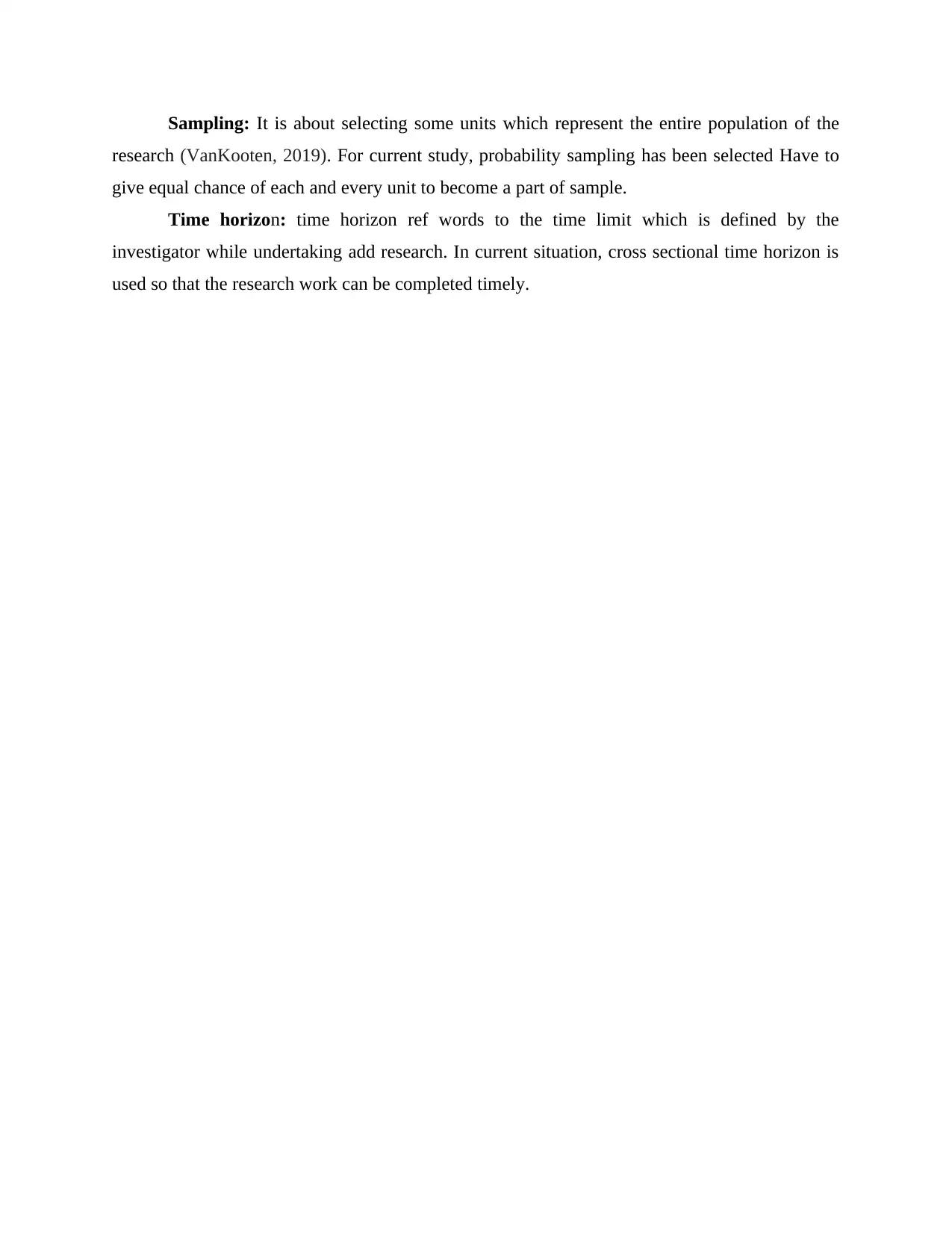
Sampling: It is about selecting some units which represent the entire population of the
research (VanKooten, 2019). For current study, probability sampling has been selected Have to
give equal chance of each and every unit to become a part of sample.
Time horizon: time horizon ref words to the time limit which is defined by the
investigator while undertaking add research. In current situation, cross sectional time horizon is
used so that the research work can be completed timely.
research (VanKooten, 2019). For current study, probability sampling has been selected Have to
give equal chance of each and every unit to become a part of sample.
Time horizon: time horizon ref words to the time limit which is defined by the
investigator while undertaking add research. In current situation, cross sectional time horizon is
used so that the research work can be completed timely.
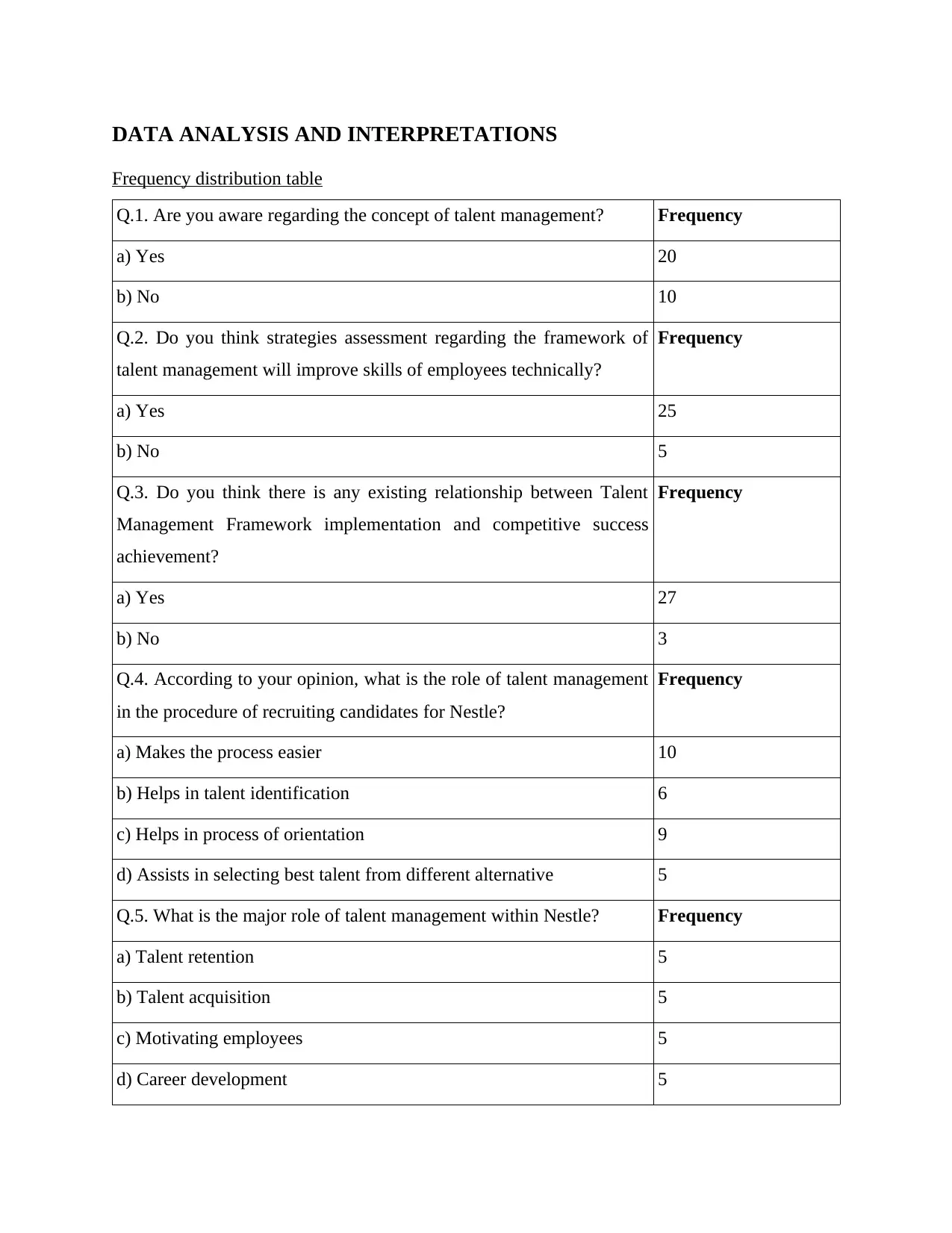
DATA ANALYSIS AND INTERPRETATIONS
Frequency distribution table
Q.1. Are you aware regarding the concept of talent management? Frequency
a) Yes 20
b) No 10
Q.2. Do you think strategies assessment regarding the framework of
talent management will improve skills of employees technically?
Frequency
a) Yes 25
b) No 5
Q.3. Do you think there is any existing relationship between Talent
Management Framework implementation and competitive success
achievement?
Frequency
a) Yes 27
b) No 3
Q.4. According to your opinion, what is the role of talent management
in the procedure of recruiting candidates for Nestle?
Frequency
a) Makes the process easier 10
b) Helps in talent identification 6
c) Helps in process of orientation 9
d) Assists in selecting best talent from different alternative 5
Q.5. What is the major role of talent management within Nestle? Frequency
a) Talent retention 5
b) Talent acquisition 5
c) Motivating employees 5
d) Career development 5
Frequency distribution table
Q.1. Are you aware regarding the concept of talent management? Frequency
a) Yes 20
b) No 10
Q.2. Do you think strategies assessment regarding the framework of
talent management will improve skills of employees technically?
Frequency
a) Yes 25
b) No 5
Q.3. Do you think there is any existing relationship between Talent
Management Framework implementation and competitive success
achievement?
Frequency
a) Yes 27
b) No 3
Q.4. According to your opinion, what is the role of talent management
in the procedure of recruiting candidates for Nestle?
Frequency
a) Makes the process easier 10
b) Helps in talent identification 6
c) Helps in process of orientation 9
d) Assists in selecting best talent from different alternative 5
Q.5. What is the major role of talent management within Nestle? Frequency
a) Talent retention 5
b) Talent acquisition 5
c) Motivating employees 5
d) Career development 5
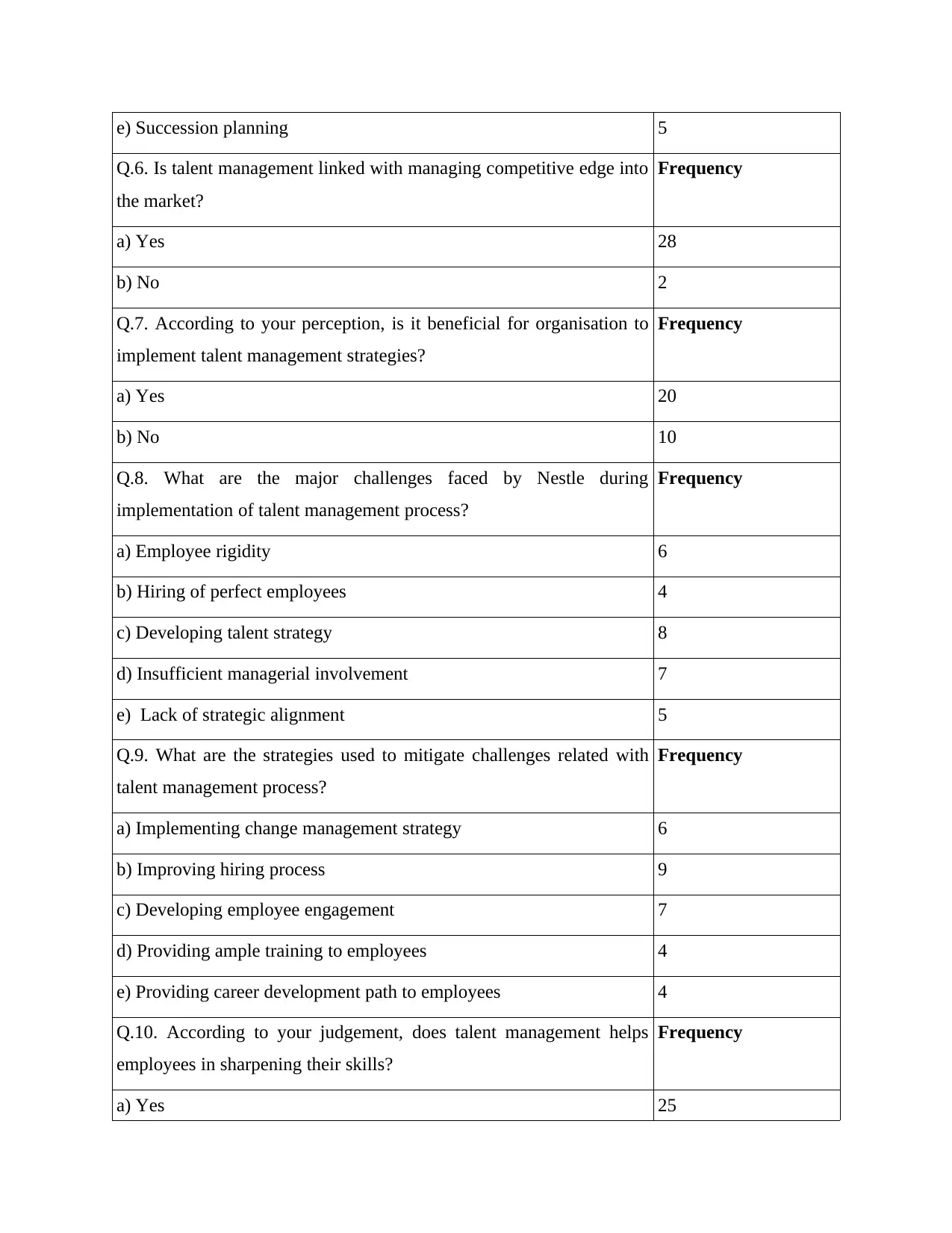
e) Succession planning 5
Q.6. Is talent management linked with managing competitive edge into
the market?
Frequency
a) Yes 28
b) No 2
Q.7. According to your perception, is it beneficial for organisation to
implement talent management strategies?
Frequency
a) Yes 20
b) No 10
Q.8. What are the major challenges faced by Nestle during
implementation of talent management process?
Frequency
a) Employee rigidity 6
b) Hiring of perfect employees 4
c) Developing talent strategy 8
d) Insufficient managerial involvement 7
e) Lack of strategic alignment 5
Q.9. What are the strategies used to mitigate challenges related with
talent management process?
Frequency
a) Implementing change management strategy 6
b) Improving hiring process 9
c) Developing employee engagement 7
d) Providing ample training to employees 4
e) Providing career development path to employees 4
Q.10. According to your judgement, does talent management helps
employees in sharpening their skills?
Frequency
a) Yes 25
Q.6. Is talent management linked with managing competitive edge into
the market?
Frequency
a) Yes 28
b) No 2
Q.7. According to your perception, is it beneficial for organisation to
implement talent management strategies?
Frequency
a) Yes 20
b) No 10
Q.8. What are the major challenges faced by Nestle during
implementation of talent management process?
Frequency
a) Employee rigidity 6
b) Hiring of perfect employees 4
c) Developing talent strategy 8
d) Insufficient managerial involvement 7
e) Lack of strategic alignment 5
Q.9. What are the strategies used to mitigate challenges related with
talent management process?
Frequency
a) Implementing change management strategy 6
b) Improving hiring process 9
c) Developing employee engagement 7
d) Providing ample training to employees 4
e) Providing career development path to employees 4
Q.10. According to your judgement, does talent management helps
employees in sharpening their skills?
Frequency
a) Yes 25
Secure Best Marks with AI Grader
Need help grading? Try our AI Grader for instant feedback on your assignments.
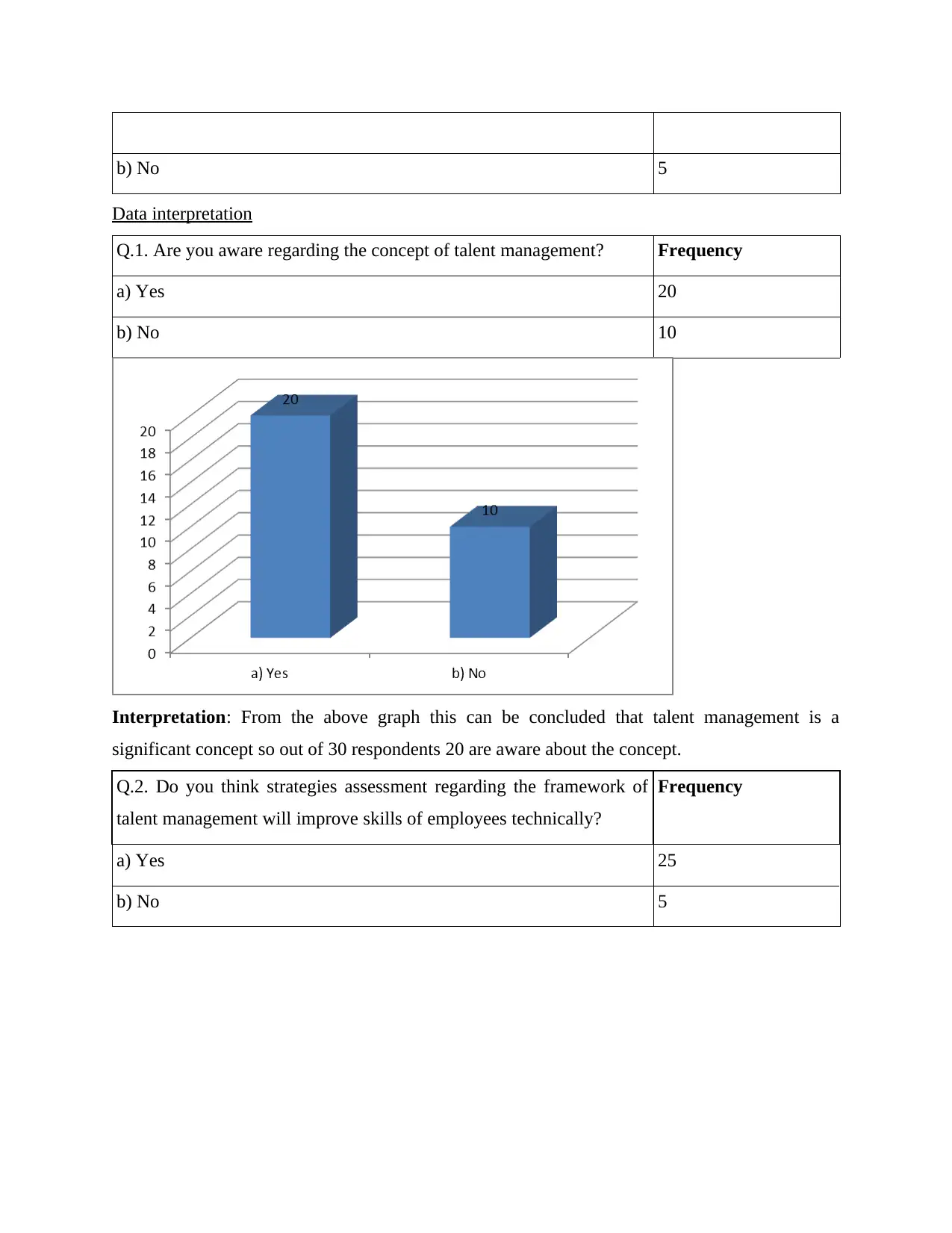
b) No 5
Data interpretation
Q.1. Are you aware regarding the concept of talent management? Frequency
a) Yes 20
b) No 10
Interpretation: From the above graph this can be concluded that talent management is a
significant concept so out of 30 respondents 20 are aware about the concept.
Q.2. Do you think strategies assessment regarding the framework of
talent management will improve skills of employees technically?
Frequency
a) Yes 25
b) No 5
Data interpretation
Q.1. Are you aware regarding the concept of talent management? Frequency
a) Yes 20
b) No 10
Interpretation: From the above graph this can be concluded that talent management is a
significant concept so out of 30 respondents 20 are aware about the concept.
Q.2. Do you think strategies assessment regarding the framework of
talent management will improve skills of employees technically?
Frequency
a) Yes 25
b) No 5
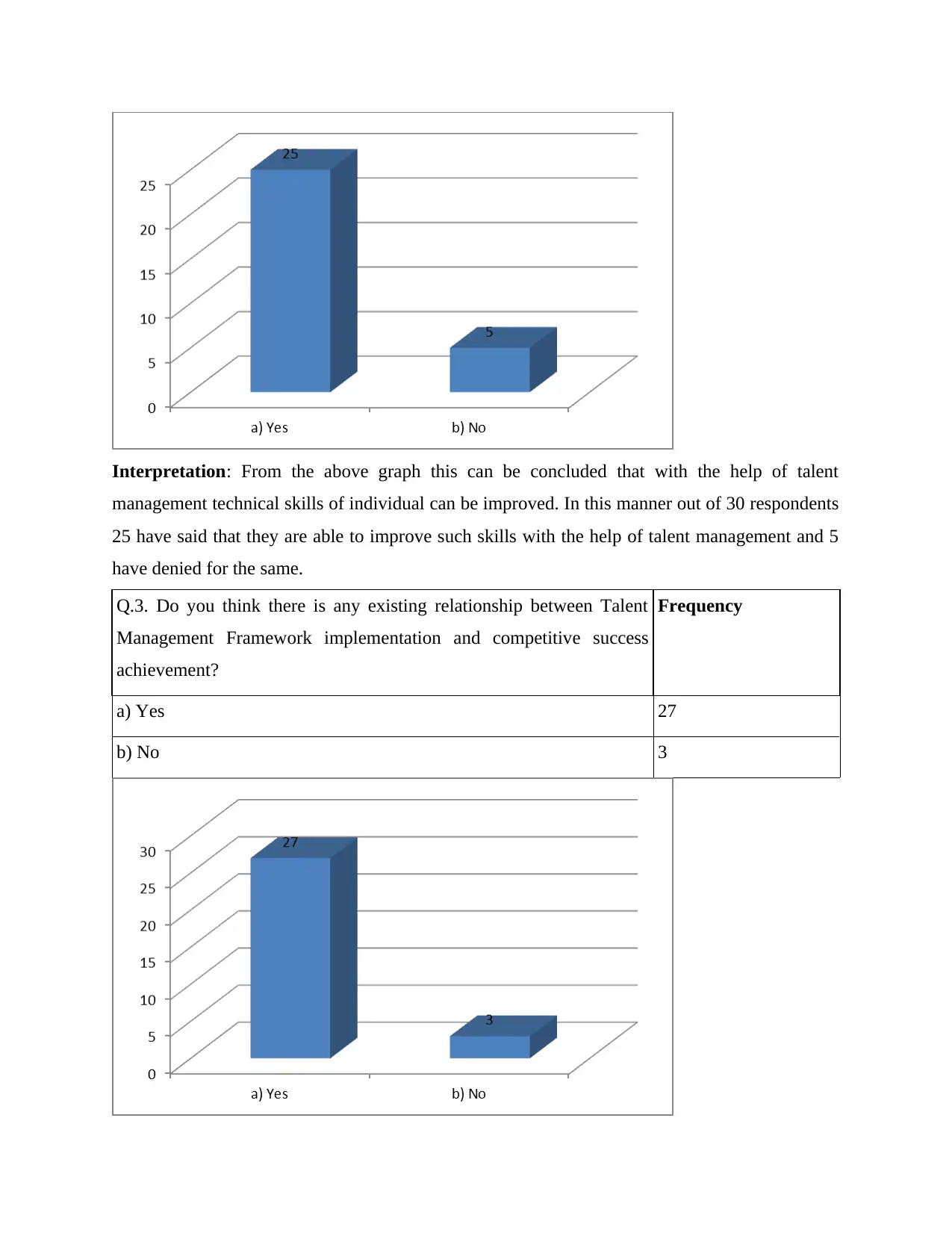
Interpretation: From the above graph this can be concluded that with the help of talent
management technical skills of individual can be improved. In this manner out of 30 respondents
25 have said that they are able to improve such skills with the help of talent management and 5
have denied for the same.
Q.3. Do you think there is any existing relationship between Talent
Management Framework implementation and competitive success
achievement?
Frequency
a) Yes 27
b) No 3
management technical skills of individual can be improved. In this manner out of 30 respondents
25 have said that they are able to improve such skills with the help of talent management and 5
have denied for the same.
Q.3. Do you think there is any existing relationship between Talent
Management Framework implementation and competitive success
achievement?
Frequency
a) Yes 27
b) No 3
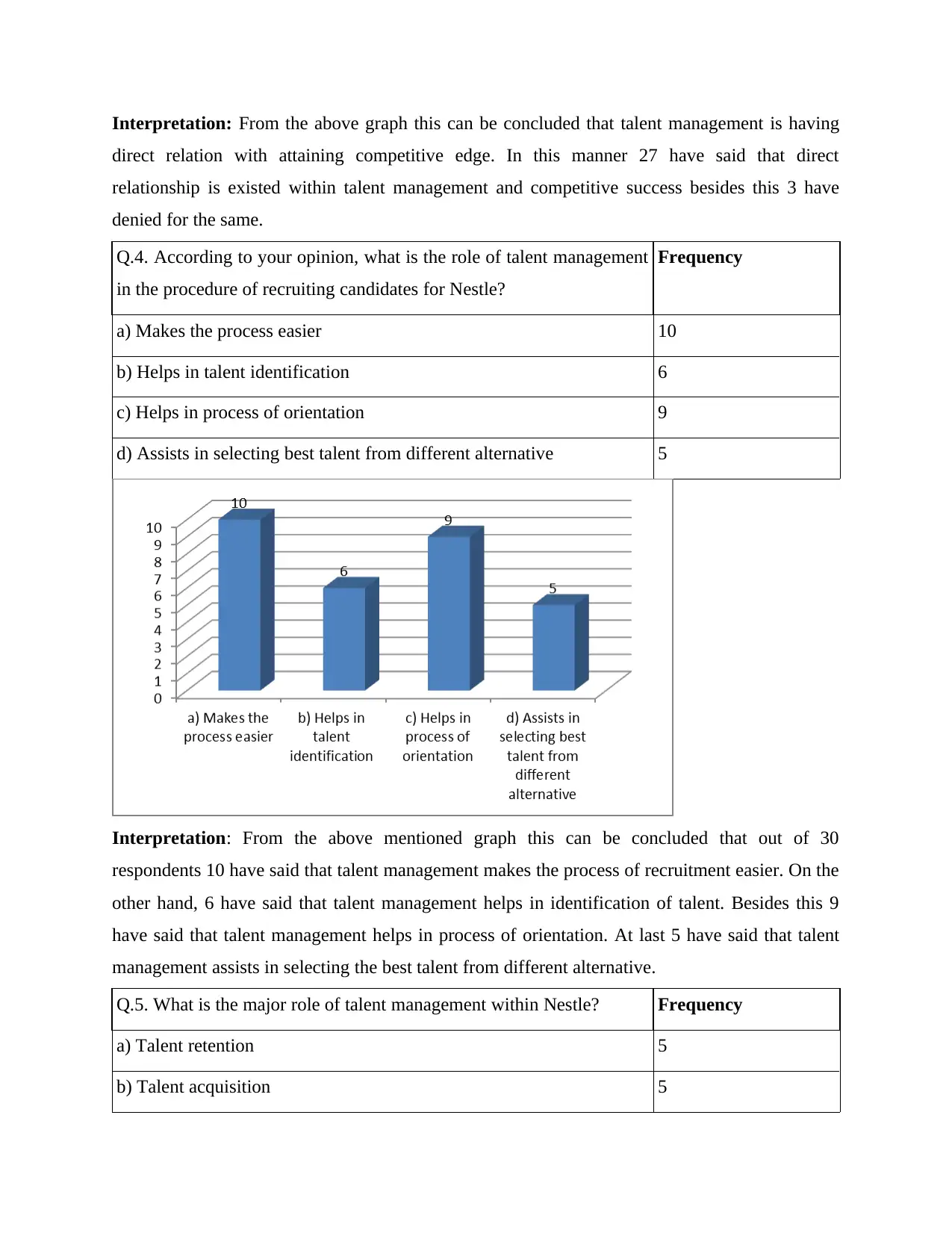
Interpretation: From the above graph this can be concluded that talent management is having
direct relation with attaining competitive edge. In this manner 27 have said that direct
relationship is existed within talent management and competitive success besides this 3 have
denied for the same.
Q.4. According to your opinion, what is the role of talent management
in the procedure of recruiting candidates for Nestle?
Frequency
a) Makes the process easier 10
b) Helps in talent identification 6
c) Helps in process of orientation 9
d) Assists in selecting best talent from different alternative 5
Interpretation: From the above mentioned graph this can be concluded that out of 30
respondents 10 have said that talent management makes the process of recruitment easier. On the
other hand, 6 have said that talent management helps in identification of talent. Besides this 9
have said that talent management helps in process of orientation. At last 5 have said that talent
management assists in selecting the best talent from different alternative.
Q.5. What is the major role of talent management within Nestle? Frequency
a) Talent retention 5
b) Talent acquisition 5
direct relation with attaining competitive edge. In this manner 27 have said that direct
relationship is existed within talent management and competitive success besides this 3 have
denied for the same.
Q.4. According to your opinion, what is the role of talent management
in the procedure of recruiting candidates for Nestle?
Frequency
a) Makes the process easier 10
b) Helps in talent identification 6
c) Helps in process of orientation 9
d) Assists in selecting best talent from different alternative 5
Interpretation: From the above mentioned graph this can be concluded that out of 30
respondents 10 have said that talent management makes the process of recruitment easier. On the
other hand, 6 have said that talent management helps in identification of talent. Besides this 9
have said that talent management helps in process of orientation. At last 5 have said that talent
management assists in selecting the best talent from different alternative.
Q.5. What is the major role of talent management within Nestle? Frequency
a) Talent retention 5
b) Talent acquisition 5
Paraphrase This Document
Need a fresh take? Get an instant paraphrase of this document with our AI Paraphraser
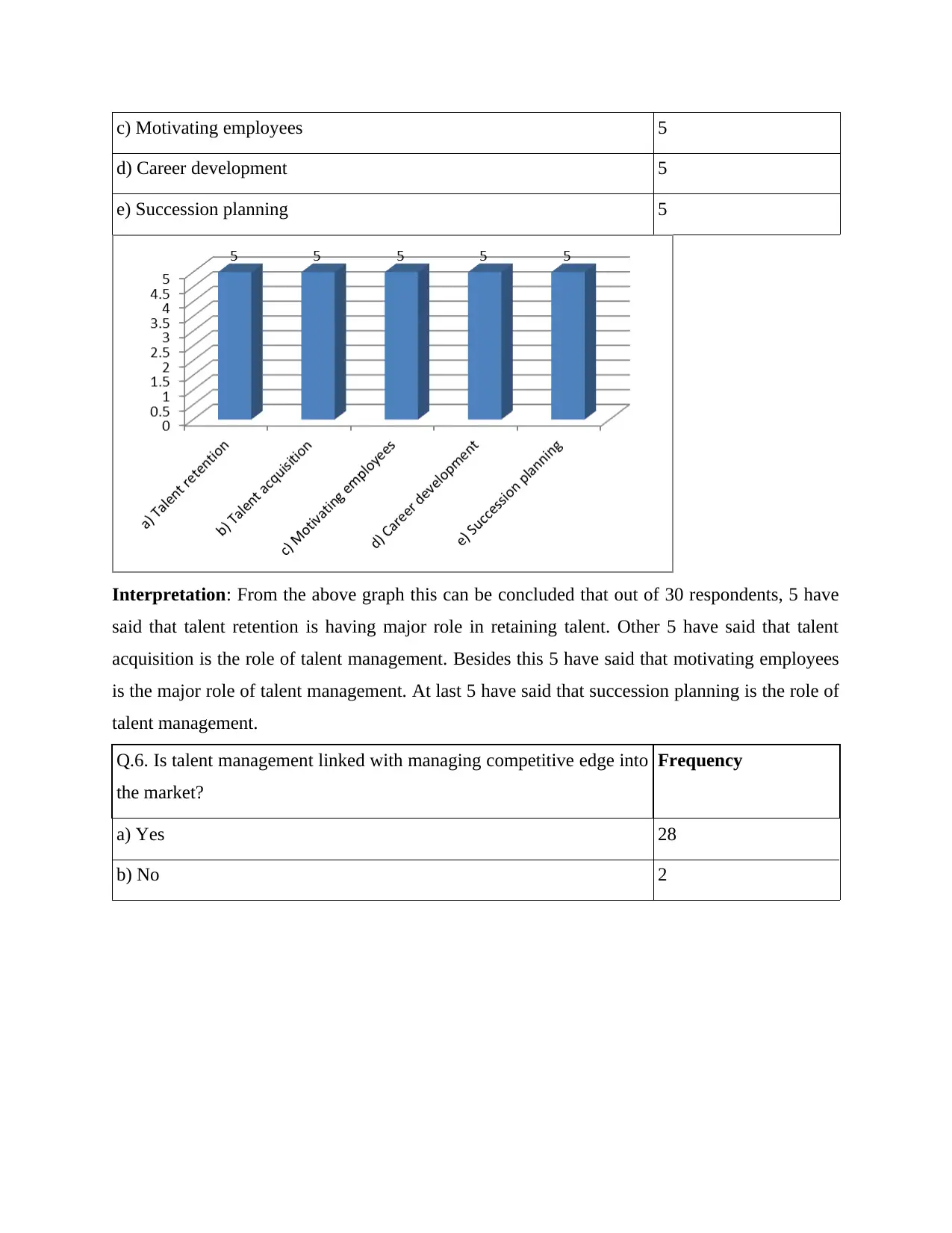
c) Motivating employees 5
d) Career development 5
e) Succession planning 5
Interpretation: From the above graph this can be concluded that out of 30 respondents, 5 have
said that talent retention is having major role in retaining talent. Other 5 have said that talent
acquisition is the role of talent management. Besides this 5 have said that motivating employees
is the major role of talent management. At last 5 have said that succession planning is the role of
talent management.
Q.6. Is talent management linked with managing competitive edge into
the market?
Frequency
a) Yes 28
b) No 2
d) Career development 5
e) Succession planning 5
Interpretation: From the above graph this can be concluded that out of 30 respondents, 5 have
said that talent retention is having major role in retaining talent. Other 5 have said that talent
acquisition is the role of talent management. Besides this 5 have said that motivating employees
is the major role of talent management. At last 5 have said that succession planning is the role of
talent management.
Q.6. Is talent management linked with managing competitive edge into
the market?
Frequency
a) Yes 28
b) No 2
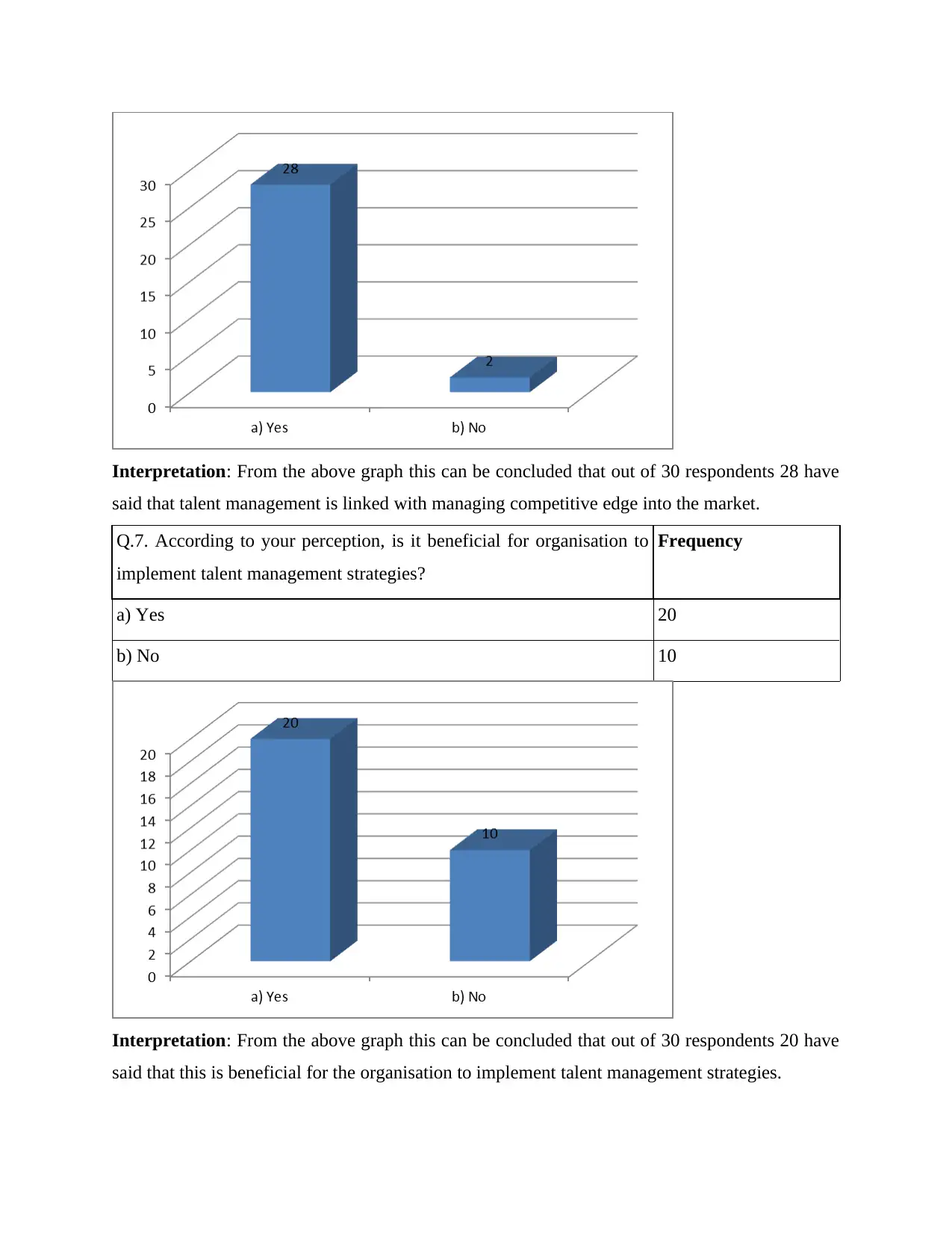
Interpretation: From the above graph this can be concluded that out of 30 respondents 28 have
said that talent management is linked with managing competitive edge into the market.
Q.7. According to your perception, is it beneficial for organisation to
implement talent management strategies?
Frequency
a) Yes 20
b) No 10
Interpretation: From the above graph this can be concluded that out of 30 respondents 20 have
said that this is beneficial for the organisation to implement talent management strategies.
said that talent management is linked with managing competitive edge into the market.
Q.7. According to your perception, is it beneficial for organisation to
implement talent management strategies?
Frequency
a) Yes 20
b) No 10
Interpretation: From the above graph this can be concluded that out of 30 respondents 20 have
said that this is beneficial for the organisation to implement talent management strategies.
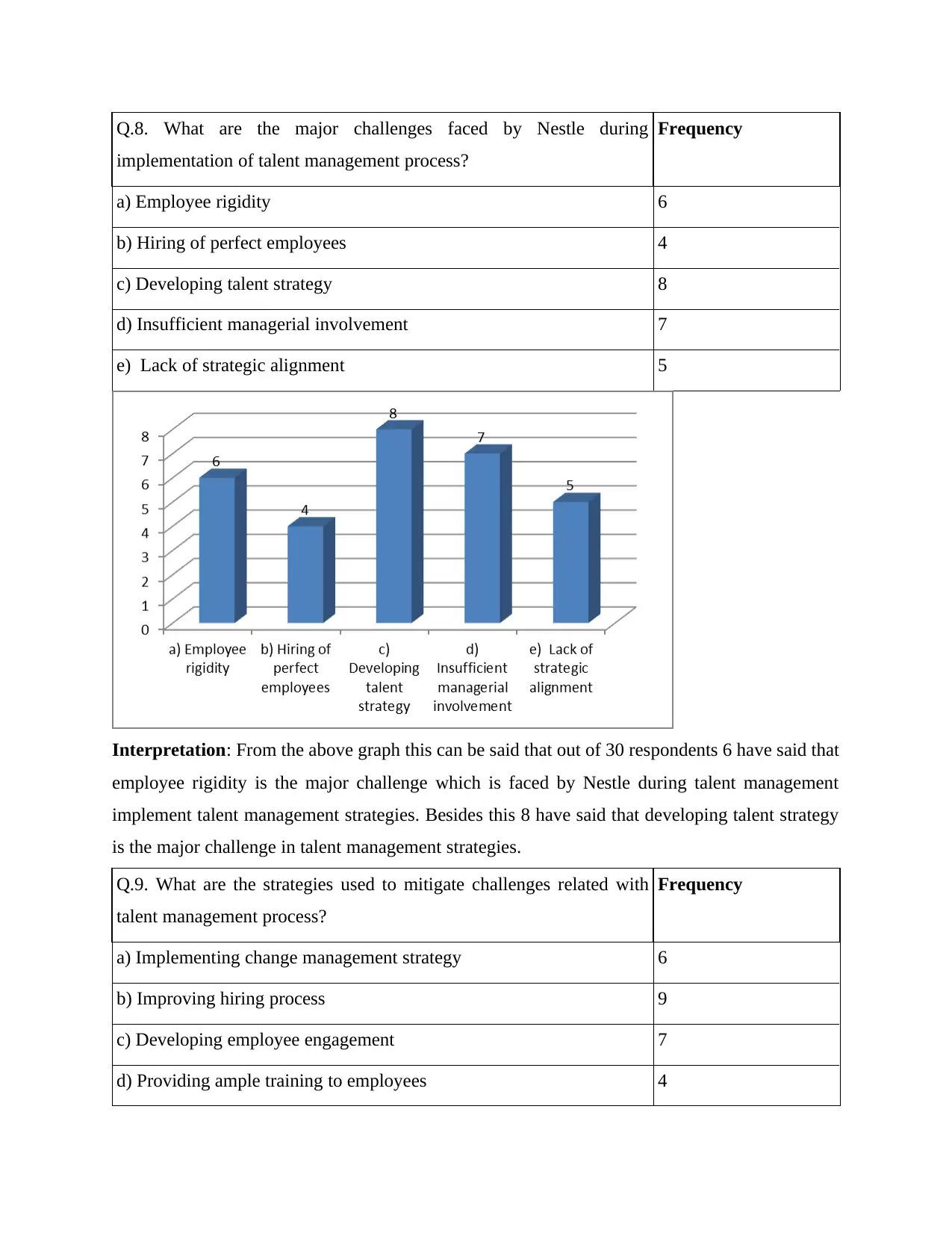
Q.8. What are the major challenges faced by Nestle during
implementation of talent management process?
Frequency
a) Employee rigidity 6
b) Hiring of perfect employees 4
c) Developing talent strategy 8
d) Insufficient managerial involvement 7
e) Lack of strategic alignment 5
Interpretation: From the above graph this can be said that out of 30 respondents 6 have said that
employee rigidity is the major challenge which is faced by Nestle during talent management
implement talent management strategies. Besides this 8 have said that developing talent strategy
is the major challenge in talent management strategies.
Q.9. What are the strategies used to mitigate challenges related with
talent management process?
Frequency
a) Implementing change management strategy 6
b) Improving hiring process 9
c) Developing employee engagement 7
d) Providing ample training to employees 4
implementation of talent management process?
Frequency
a) Employee rigidity 6
b) Hiring of perfect employees 4
c) Developing talent strategy 8
d) Insufficient managerial involvement 7
e) Lack of strategic alignment 5
Interpretation: From the above graph this can be said that out of 30 respondents 6 have said that
employee rigidity is the major challenge which is faced by Nestle during talent management
implement talent management strategies. Besides this 8 have said that developing talent strategy
is the major challenge in talent management strategies.
Q.9. What are the strategies used to mitigate challenges related with
talent management process?
Frequency
a) Implementing change management strategy 6
b) Improving hiring process 9
c) Developing employee engagement 7
d) Providing ample training to employees 4
Secure Best Marks with AI Grader
Need help grading? Try our AI Grader for instant feedback on your assignments.
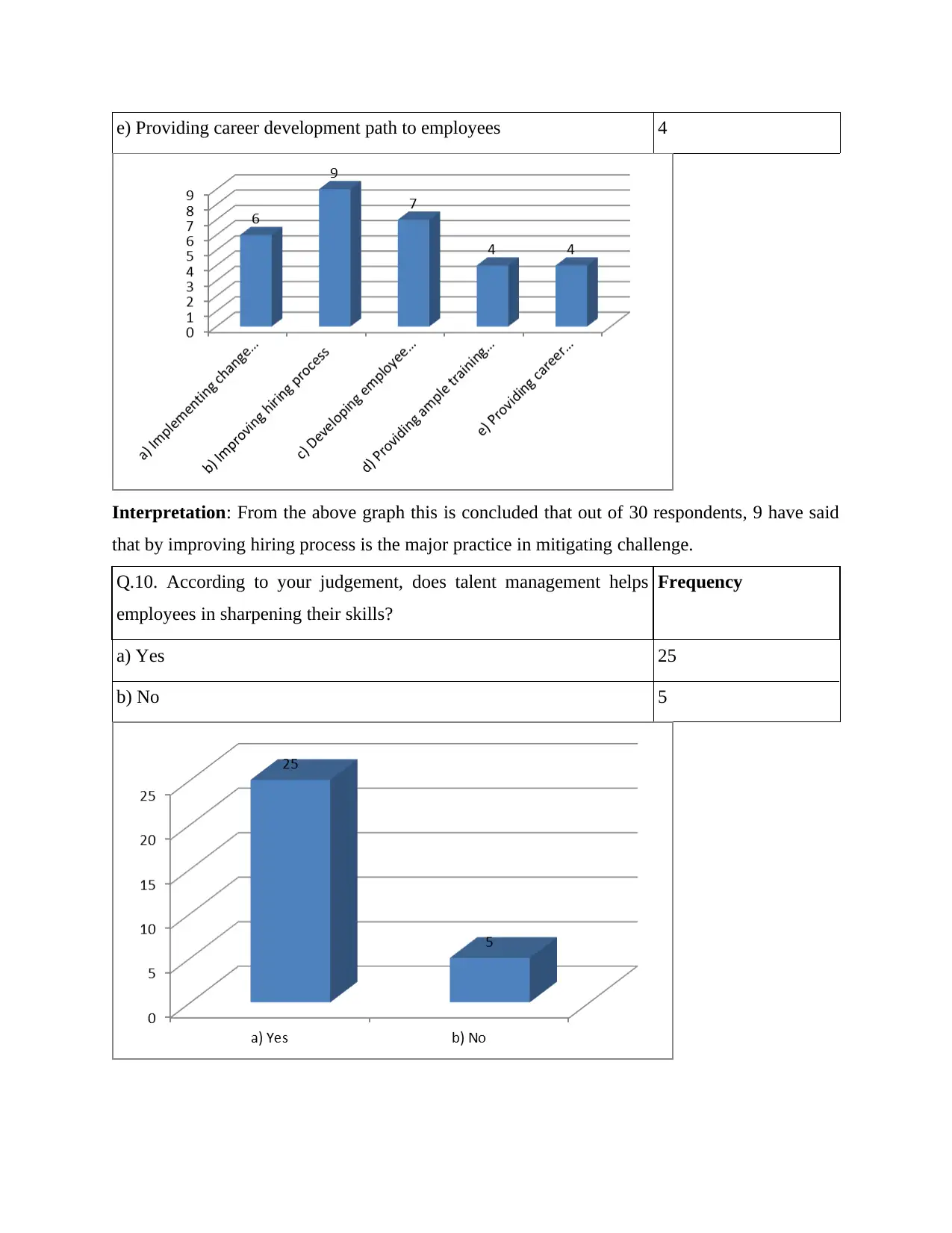
e) Providing career development path to employees 4
Interpretation: From the above graph this is concluded that out of 30 respondents, 9 have said
that by improving hiring process is the major practice in mitigating challenge.
Q.10. According to your judgement, does talent management helps
employees in sharpening their skills?
Frequency
a) Yes 25
b) No 5
Interpretation: From the above graph this is concluded that out of 30 respondents, 9 have said
that by improving hiring process is the major practice in mitigating challenge.
Q.10. According to your judgement, does talent management helps
employees in sharpening their skills?
Frequency
a) Yes 25
b) No 5
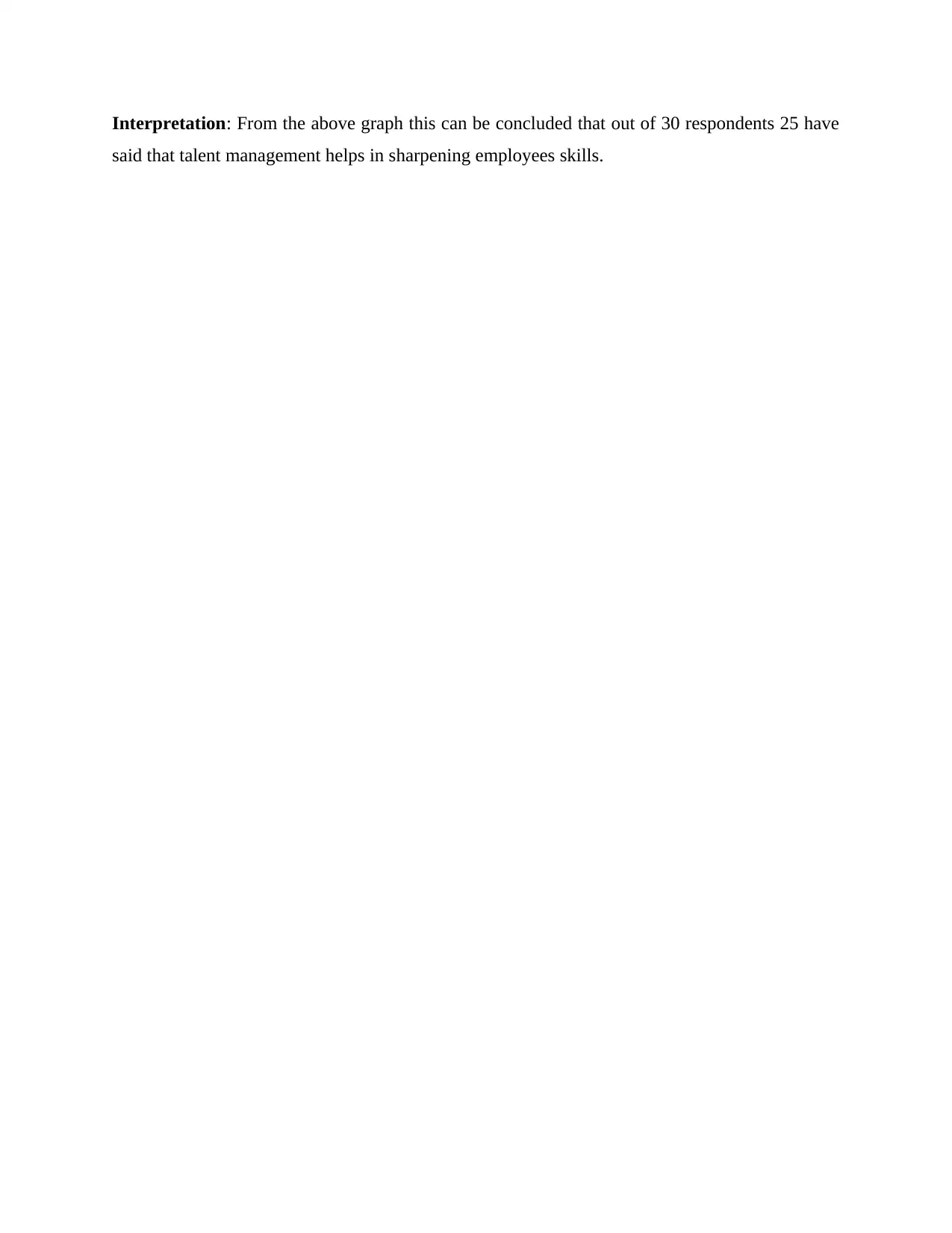
Interpretation: From the above graph this can be concluded that out of 30 respondents 25 have
said that talent management helps in sharpening employees skills.
said that talent management helps in sharpening employees skills.
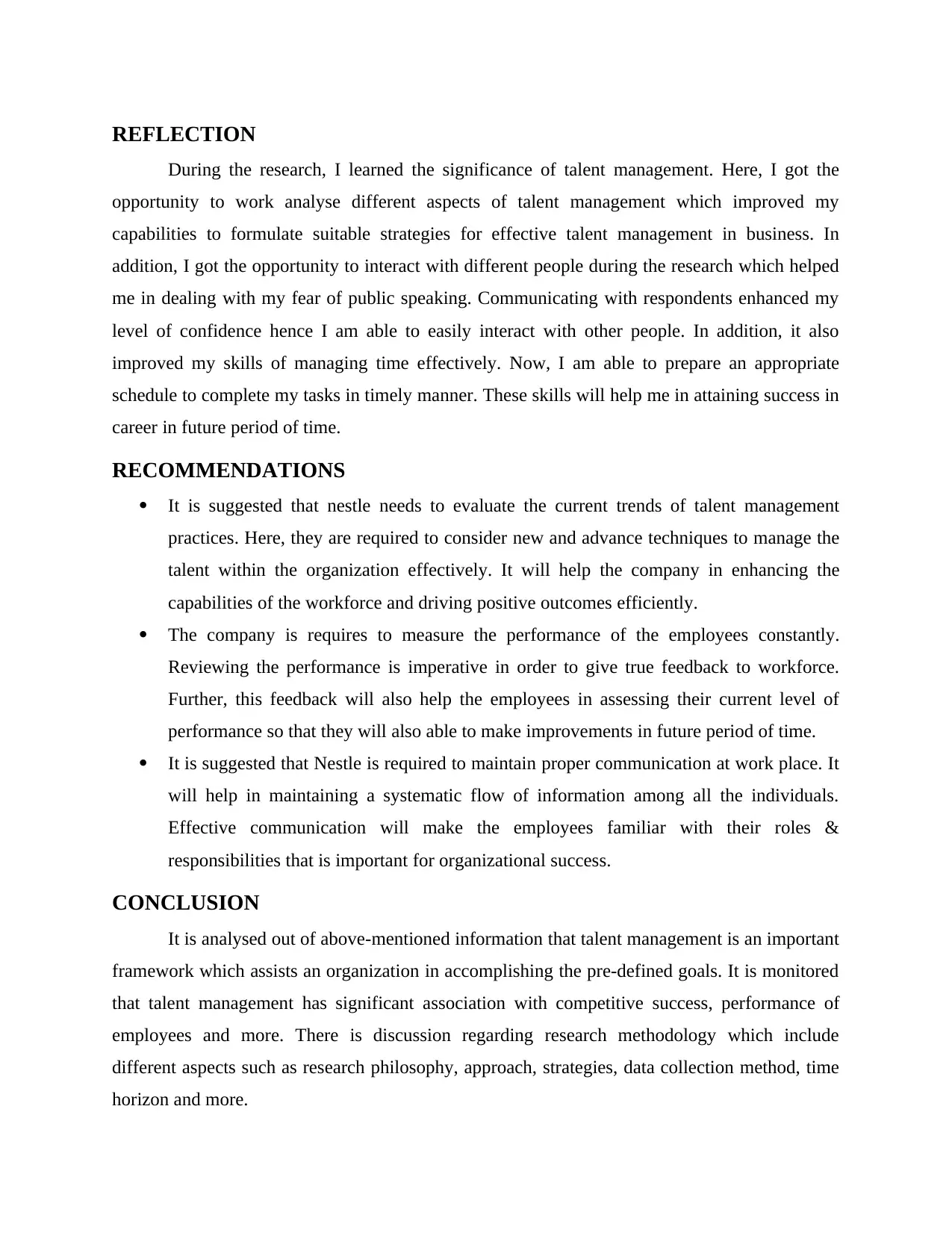
REFLECTION
During the research, I learned the significance of talent management. Here, I got the
opportunity to work analyse different aspects of talent management which improved my
capabilities to formulate suitable strategies for effective talent management in business. In
addition, I got the opportunity to interact with different people during the research which helped
me in dealing with my fear of public speaking. Communicating with respondents enhanced my
level of confidence hence I am able to easily interact with other people. In addition, it also
improved my skills of managing time effectively. Now, I am able to prepare an appropriate
schedule to complete my tasks in timely manner. These skills will help me in attaining success in
career in future period of time.
RECOMMENDATIONS
It is suggested that nestle needs to evaluate the current trends of talent management
practices. Here, they are required to consider new and advance techniques to manage the
talent within the organization effectively. It will help the company in enhancing the
capabilities of the workforce and driving positive outcomes efficiently.
The company is requires to measure the performance of the employees constantly.
Reviewing the performance is imperative in order to give true feedback to workforce.
Further, this feedback will also help the employees in assessing their current level of
performance so that they will also able to make improvements in future period of time.
It is suggested that Nestle is required to maintain proper communication at work place. It
will help in maintaining a systematic flow of information among all the individuals.
Effective communication will make the employees familiar with their roles &
responsibilities that is important for organizational success.
CONCLUSION
It is analysed out of above-mentioned information that talent management is an important
framework which assists an organization in accomplishing the pre-defined goals. It is monitored
that talent management has significant association with competitive success, performance of
employees and more. There is discussion regarding research methodology which include
different aspects such as research philosophy, approach, strategies, data collection method, time
horizon and more.
During the research, I learned the significance of talent management. Here, I got the
opportunity to work analyse different aspects of talent management which improved my
capabilities to formulate suitable strategies for effective talent management in business. In
addition, I got the opportunity to interact with different people during the research which helped
me in dealing with my fear of public speaking. Communicating with respondents enhanced my
level of confidence hence I am able to easily interact with other people. In addition, it also
improved my skills of managing time effectively. Now, I am able to prepare an appropriate
schedule to complete my tasks in timely manner. These skills will help me in attaining success in
career in future period of time.
RECOMMENDATIONS
It is suggested that nestle needs to evaluate the current trends of talent management
practices. Here, they are required to consider new and advance techniques to manage the
talent within the organization effectively. It will help the company in enhancing the
capabilities of the workforce and driving positive outcomes efficiently.
The company is requires to measure the performance of the employees constantly.
Reviewing the performance is imperative in order to give true feedback to workforce.
Further, this feedback will also help the employees in assessing their current level of
performance so that they will also able to make improvements in future period of time.
It is suggested that Nestle is required to maintain proper communication at work place. It
will help in maintaining a systematic flow of information among all the individuals.
Effective communication will make the employees familiar with their roles &
responsibilities that is important for organizational success.
CONCLUSION
It is analysed out of above-mentioned information that talent management is an important
framework which assists an organization in accomplishing the pre-defined goals. It is monitored
that talent management has significant association with competitive success, performance of
employees and more. There is discussion regarding research methodology which include
different aspects such as research philosophy, approach, strategies, data collection method, time
horizon and more.
Paraphrase This Document
Need a fresh take? Get an instant paraphrase of this document with our AI Paraphraser
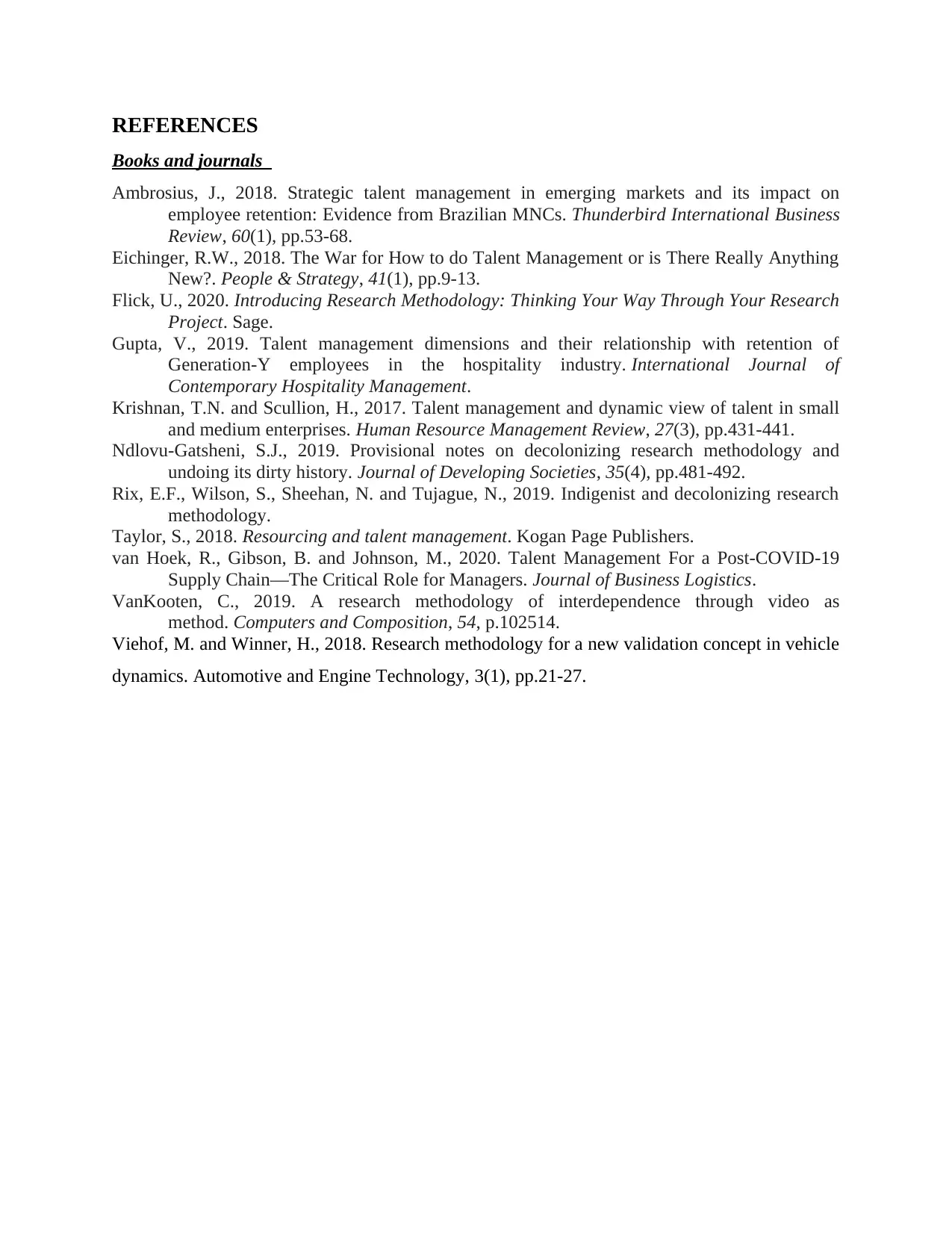
REFERENCES
Books and journals
Ambrosius, J., 2018. Strategic talent management in emerging markets and its impact on
employee retention: Evidence from Brazilian MNCs. Thunderbird International Business
Review, 60(1), pp.53-68.
Eichinger, R.W., 2018. The War for How to do Talent Management or is There Really Anything
New?. People & Strategy, 41(1), pp.9-13.
Flick, U., 2020. Introducing Research Methodology: Thinking Your Way Through Your Research
Project. Sage.
Gupta, V., 2019. Talent management dimensions and their relationship with retention of
Generation-Y employees in the hospitality industry. International Journal of
Contemporary Hospitality Management.
Krishnan, T.N. and Scullion, H., 2017. Talent management and dynamic view of talent in small
and medium enterprises. Human Resource Management Review, 27(3), pp.431-441.
Ndlovu-Gatsheni, S.J., 2019. Provisional notes on decolonizing research methodology and
undoing its dirty history. Journal of Developing Societies, 35(4), pp.481-492.
Rix, E.F., Wilson, S., Sheehan, N. and Tujague, N., 2019. Indigenist and decolonizing research
methodology.
Taylor, S., 2018. Resourcing and talent management. Kogan Page Publishers.
van Hoek, R., Gibson, B. and Johnson, M., 2020. Talent Management For a Post‐COVID‐19
Supply Chain—The Critical Role for Managers. Journal of Business Logistics.
VanKooten, C., 2019. A research methodology of interdependence through video as
method. Computers and Composition, 54, p.102514.
Viehof, M. and Winner, H., 2018. Research methodology for a new validation concept in vehicle
dynamics. Automotive and Engine Technology, 3(1), pp.21-27.
Books and journals
Ambrosius, J., 2018. Strategic talent management in emerging markets and its impact on
employee retention: Evidence from Brazilian MNCs. Thunderbird International Business
Review, 60(1), pp.53-68.
Eichinger, R.W., 2018. The War for How to do Talent Management or is There Really Anything
New?. People & Strategy, 41(1), pp.9-13.
Flick, U., 2020. Introducing Research Methodology: Thinking Your Way Through Your Research
Project. Sage.
Gupta, V., 2019. Talent management dimensions and their relationship with retention of
Generation-Y employees in the hospitality industry. International Journal of
Contemporary Hospitality Management.
Krishnan, T.N. and Scullion, H., 2017. Talent management and dynamic view of talent in small
and medium enterprises. Human Resource Management Review, 27(3), pp.431-441.
Ndlovu-Gatsheni, S.J., 2019. Provisional notes on decolonizing research methodology and
undoing its dirty history. Journal of Developing Societies, 35(4), pp.481-492.
Rix, E.F., Wilson, S., Sheehan, N. and Tujague, N., 2019. Indigenist and decolonizing research
methodology.
Taylor, S., 2018. Resourcing and talent management. Kogan Page Publishers.
van Hoek, R., Gibson, B. and Johnson, M., 2020. Talent Management For a Post‐COVID‐19
Supply Chain—The Critical Role for Managers. Journal of Business Logistics.
VanKooten, C., 2019. A research methodology of interdependence through video as
method. Computers and Composition, 54, p.102514.
Viehof, M. and Winner, H., 2018. Research methodology for a new validation concept in vehicle
dynamics. Automotive and Engine Technology, 3(1), pp.21-27.
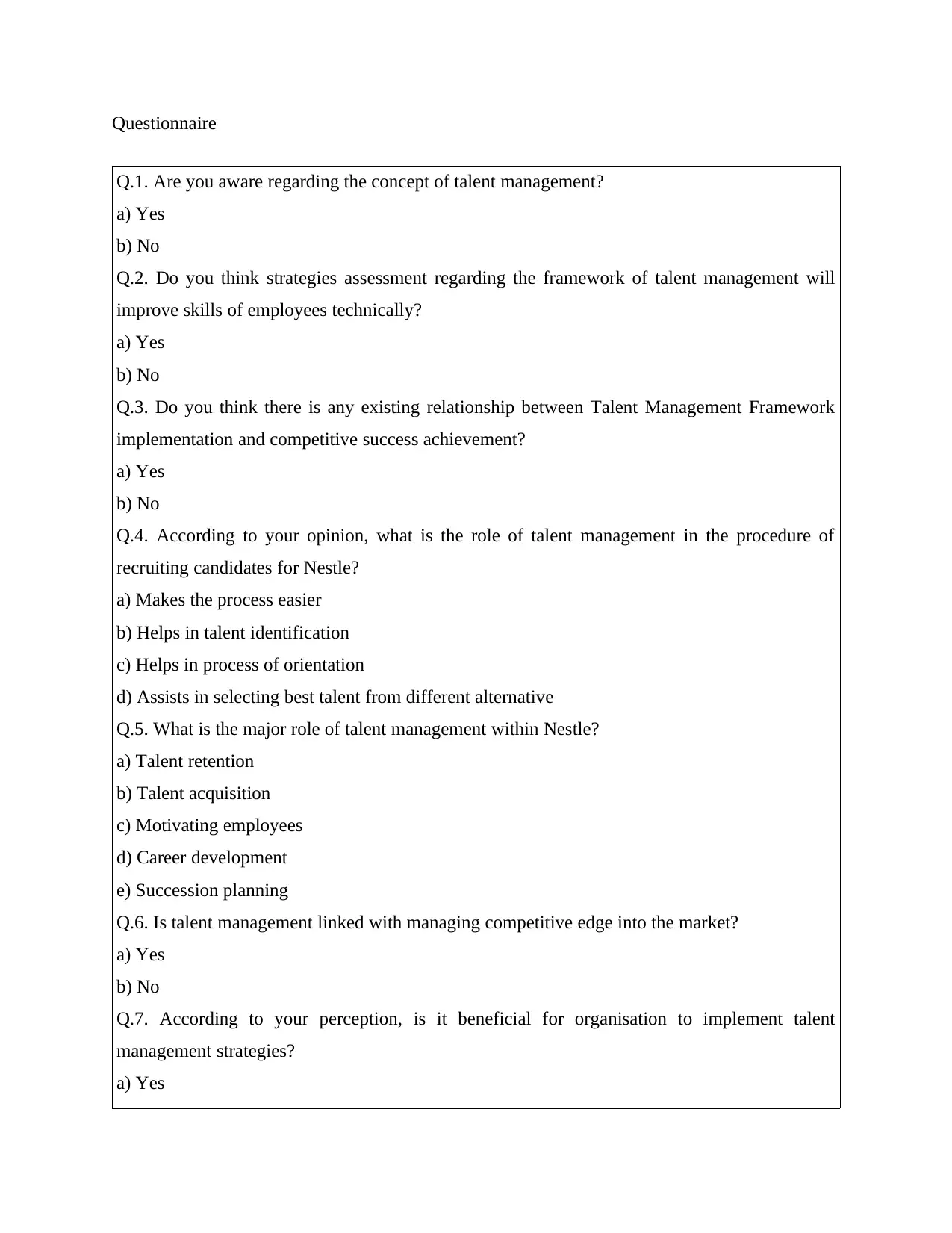
Questionnaire
Q.1. Are you aware regarding the concept of talent management?
a) Yes
b) No
Q.2. Do you think strategies assessment regarding the framework of talent management will
improve skills of employees technically?
a) Yes
b) No
Q.3. Do you think there is any existing relationship between Talent Management Framework
implementation and competitive success achievement?
a) Yes
b) No
Q.4. According to your opinion, what is the role of talent management in the procedure of
recruiting candidates for Nestle?
a) Makes the process easier
b) Helps in talent identification
c) Helps in process of orientation
d) Assists in selecting best talent from different alternative
Q.5. What is the major role of talent management within Nestle?
a) Talent retention
b) Talent acquisition
c) Motivating employees
d) Career development
e) Succession planning
Q.6. Is talent management linked with managing competitive edge into the market?
a) Yes
b) No
Q.7. According to your perception, is it beneficial for organisation to implement talent
management strategies?
a) Yes
Q.1. Are you aware regarding the concept of talent management?
a) Yes
b) No
Q.2. Do you think strategies assessment regarding the framework of talent management will
improve skills of employees technically?
a) Yes
b) No
Q.3. Do you think there is any existing relationship between Talent Management Framework
implementation and competitive success achievement?
a) Yes
b) No
Q.4. According to your opinion, what is the role of talent management in the procedure of
recruiting candidates for Nestle?
a) Makes the process easier
b) Helps in talent identification
c) Helps in process of orientation
d) Assists in selecting best talent from different alternative
Q.5. What is the major role of talent management within Nestle?
a) Talent retention
b) Talent acquisition
c) Motivating employees
d) Career development
e) Succession planning
Q.6. Is talent management linked with managing competitive edge into the market?
a) Yes
b) No
Q.7. According to your perception, is it beneficial for organisation to implement talent
management strategies?
a) Yes
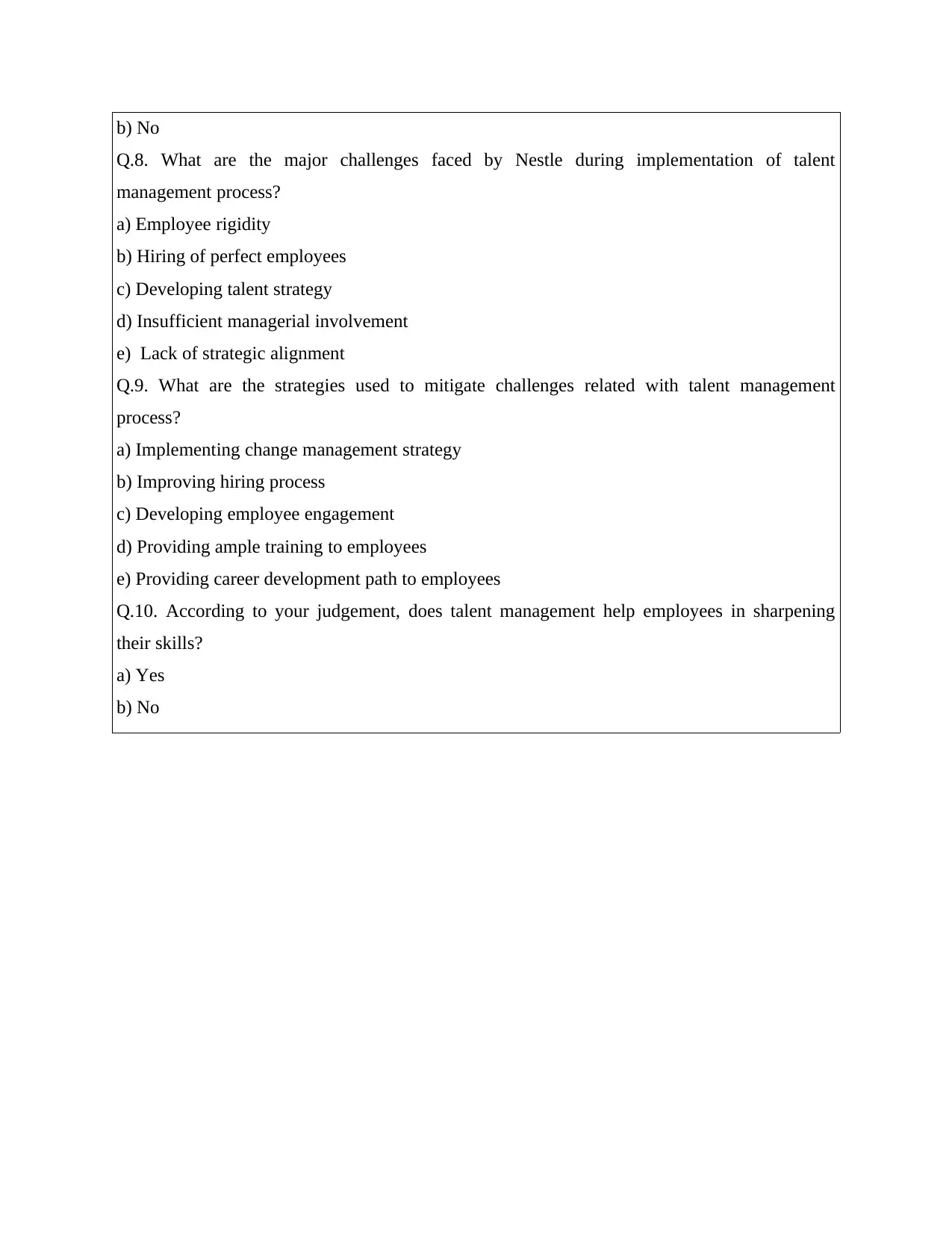
b) No
Q.8. What are the major challenges faced by Nestle during implementation of talent
management process?
a) Employee rigidity
b) Hiring of perfect employees
c) Developing talent strategy
d) Insufficient managerial involvement
e) Lack of strategic alignment
Q.9. What are the strategies used to mitigate challenges related with talent management
process?
a) Implementing change management strategy
b) Improving hiring process
c) Developing employee engagement
d) Providing ample training to employees
e) Providing career development path to employees
Q.10. According to your judgement, does talent management help employees in sharpening
their skills?
a) Yes
b) No
Q.8. What are the major challenges faced by Nestle during implementation of talent
management process?
a) Employee rigidity
b) Hiring of perfect employees
c) Developing talent strategy
d) Insufficient managerial involvement
e) Lack of strategic alignment
Q.9. What are the strategies used to mitigate challenges related with talent management
process?
a) Implementing change management strategy
b) Improving hiring process
c) Developing employee engagement
d) Providing ample training to employees
e) Providing career development path to employees
Q.10. According to your judgement, does talent management help employees in sharpening
their skills?
a) Yes
b) No
1 out of 22
Related Documents
Your All-in-One AI-Powered Toolkit for Academic Success.
+13062052269
info@desklib.com
Available 24*7 on WhatsApp / Email
![[object Object]](/_next/static/media/star-bottom.7253800d.svg)
Unlock your academic potential
© 2024 | Zucol Services PVT LTD | All rights reserved.




